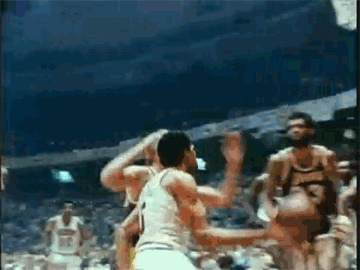Sally Kempton on keeping up with Carmen Miranda. Short and Sweet.
Forever Young
I’ve got a little piece on our old pal Ichiro in the new issue of Esquire.
The editor’s were cool enough to include me in their “Contributors” page. They asked if I wanted to be photographed or illustrated. Duh—illustrated. Okay, so the results are, well, interesting, but what the hell? You only live once!
[Photo Credit: Hisashi Murayama]
Beat of the Day
It’s been awhile. Too long. Listen to the 1944 Esquire All-American Jazz Concert. It’s hot.
Esky Daze
Hey Hey,
Know it’s been slower n slow around here these days—and thanks to Will for keeping a light on. That’s because I’m spending all my time curating and editing the Esquire Classic site. Oh, it’s a long story but I got job eliminated last December after 13 years at Time Inc. I arrived there in the spring of 2002 as a temp having spent my twenties working in film cutting rooms. I had a good, long run at the company—saved money, got married, saw a parent die, and created this site. I don’t think about it often but I’m as proud of this blog as I am of anything I’ve ever been involved with.
The Banter isn’t going anywhere. Even though I’m busy, and even though the posting has been nonexistent of late, I have no desire to close-up shop (The beauty part about the Banter for me is that at some point I let go of having expectations of what the site should be; I just let it flow and that helps me continue). But things are different and I’m not sure they’ll soon return to what they’ve been in the past. All I can say is that I’m happy to have you and I hope you dig whatever it is I can offer at any given time.
I plan to be around for the season but at this point you’re getting your Yankee fix elsewhere. All I can do is keep the jernt open so you old timer’s can fall through and hang out.
In the meantime, I’ve segued nicely into this gig with Esquire. You guys are aware of the preservation work I’ve done with classic journalism and criticism. Well, Esky is an embarrassment of riches. I’ve got so much reading on my plate, I can’t keep up. It’s overwhelming and exhilarating. There are so many distinct voices: John Sack, Sally Kempton, Bill Zehme, Norman Mailer, David Foster Wallace, Tom Wolfe, Nora Ephron, Pete Dexter, Mark Jacobson, Richard Ben. It’s amazing.
There’s a bunch of pressure too and no guarantee that Esquire Classic will pan out—with or without me. You gotta pay for it—$5 a month or $40 for the year. If you’re into that sort of thing it’s worth the dough, believe me. But no pressure at all on my part—I certainly won’t be offended if you don’t subscribe.
Meantime, I’ve strapped myself in for the ride and am having a great time. Learning a ton and not taking any of it for granted. Here’s the blog.
[Illustration by Gottfried Helnwein]
New York Minute
Two days ago marked the 35th anniversary of John Lennon’s murder. Over at Esquire Classic, I curated a post featuring a Esquire cover story on Lennon which appeared in November, 1980. Then, I also interviewed Laurence Shames, who wrote the piece on Lennon:
EC: Where were you when Lennon was shot?
LS: By a truly bizarre coincidence, I was actually on West Seventy-second Street when the shooting occurred, having an after-dinner drink with a friend who lived across the street and a few doors west of the Dakota. We heard the shots. After that my memory gets really hazy. Can’t remember when we learned exactly what had happened. I think I must have been in clinical shock. No memory of walking home or the rest of that night. Really a difficult time.
I was 9 when Lennon was killed and don’t remember where I was. I probably didn’t hear the news until the following morning. I do recall watching the news and seeing the footage of the crowds of people outside of the Dakota and in Central Park–singing and crying. I knew John was a Beatle, of course, but oddly, I thought of him more as an Upper West Sider.
[Photo Credit: Getty Images]
Why Don’t We Do it in the Road?
Thanks to the essential weekly newsletter, The Sunday Long Read (compiled with taste and care by Don Van Natta Jr. and Jacob Feldman), I found Alex Bilmes’ excellent British Esquire interview with Paul McCartney:
ESQ: Was fame all it was cracked up to be, when you found it?
PM: It sort of was really, yeah. Because part of what it’s cracked up to be is difficult as well as great. They’d warned that. I remember making a very conscious choice: “OK, we’re getting really famous now, you’ve got to decide, whether or not to go for it.” For some reason Marilyn Monroe came into my mind. Like: this could be horrible. It was actually after a trip to Greece. We weren’t famous in Greece, and I’d hung out with the hotel band and was chatting to them: “I’m in a band, too, you know? We’re called The Beatles.” And I got a glazed look from them. I thought, “This is OK, if the fame gets too much we can always come to Greece.” Then, of course, the next year it was like, “Oh, no, you’re famous in Greece, too. Oh, God.” And I remember thinking, “Do you want to do this or don’t you?” And it was, “I like it too much to stop.”
ESQ: Some people struggle greatly with being famous. It screws them up. You seem to have taken to fame with a certain amount of ease. You embraced it.
PM: I think to some degree that’s true. What happens is, if your life goes wrong, like with the breakup of The Beatles, then fame is a nightmare because you can’t escape it, and you’ve created it. That’s when the difficulty kicks in. But what you’re saying is, some people it kicks in anyway, even if they’re doing all right.
ESQ: They can’t handle the attention.
PM: I don’t mind that. I have a joke with my daughter Mary: sometimes I won’t be in a great mood and we’ll go somewhere and the people will be all over me and she’ll turn to Nancy and say, “He likes a bit of adulation. It cheers him up,” and the thing is, yep, that is true. All my life I’ve been trying to win a school prize or trying to do OK in an exam or trying to get a good job. I’ve always been trying to do something where people go: you’re good. When you get it, it seems a shame to me to go, oh, shit. To me it’s like, this is what I wanted. I do like it, I must say. The attention’s never really bothered me. I’ve always thought, “OK, you’re famous, you’ve chosen that path. You can’t blame anyone else.” As long as you’re enjoying it that’s good. And when it goes wrong you’re just going to have to deal with it.
Sign up for the newsletter, here.
[Photo Credit: Linda McCartney via Everyday I Show]
BGS: Darkness Visible
Over at the Daily Beast, check out Philip Caputo’s excellent Esquire profile of William Styron:
A private man when compared to professional celebrities, say, Mailer, he did not wish to pursue the subject any further. Prying into a living writer’s personal life, he said, was “trivial, a degrading pastime that is best left to gossip columnists. What’s important is a writer’s work.”
And how, at sixty, did he assess his work, I asked, mentioning that writer Richard Yates had described him as “probably the finest living novelist we have.”
Styron’s self-appraisal was more modest. “I have created and, I hope, will continue to create a few people whom readers will want to read about after I’m gone,” he said. “I still feel that I have years ahead of me to be able to say more with the same talent that I have been endowed with.”
A few months after he said that, Styron very nearly lost those years, and the talent that had produced Lie Down in Darkness and Sophie’s Choice collapsed to the point that he could not read and comprehend a simple newspaper article, let alone write anything. The disease that struck him used to be called melancholia. Its current name is clinical depression—a cloak of despair that falls over a man or woman and makes every waking moment so painful that the victim loses all desire to live.
I was made aware of his breakdown last fall, when Styron called me at my home in Key West and told me he was suffering from a profound depression, which, he then thought, had been caused by tranquilizers prescribed to ease his withdrawal from alcohol. He was, he’d said, considering committing himself to a psychiatric hospital.
The news shocked me because I had formed an image of him as a contented man—contented, that is, compared to other novelists I knew, including myself. Naively, I had persuaded myself that his stable marriage, affluence, and “literary gentleman” style of life had insulated him from the grave misfortunes that seem to befall most American writers.
l heard nothing from or about him for weeks; then, in the winter, I learned from a New York magazine editor that Styron had been committed to the psychiatric ward of Yale-New Haven hospital.
There was no other word until this spring, when the same editor telephoned with what might be called the good news and the bad news. Good news first: Styron had been released. The bad news was, he’d been so ravaged by his bout with depression that he had abandoned The Way of the Warrior. Worse, the editor implied, Styron’s career might be at an end. This information was more than distressing; I refused to accept the idea that Styron’s voice could be silenced by anything short of death. I wrote him a letter, a somewhat embarrassing letter, for it was full of tough-guy, gung-ho attempts at reinspiring him, the sort of thing a corner-man might say to an exhausted fighter, but inappropriate when addressed to a sixty-year-old author recovering from a nervous breakdown. The gist of it was that writers sometimes need as much courage as warriors, courage of a different kind. If he was abandoning his book for artistic reasons; that was one thing, I said; but if he was doing so because he no longer felt up to it, he had to force himself to keep going. I then invoked the “never retreat, never surrender” spirit of the Marine Corps. It would not have surprised me if Styron had not bothered to reply to such rah-rah, but I received an encouraging answer in early April.
“Let me say again how grateful I am to you for your letter,” he wrote. “Corny as it may appear, it seems that only a Marine can be truly aware of another Marine’s suffering; you gave me a nice jolt of good cheer. Thanks from the depths. I’m pleased and proud of your friendship.”
And I was pleased that I had done some good after all. Still more pleasing was the news that he had not given up on The Way of the Warrior.
“It’s not so much abandonment,” he’d said in his letter, “as extreme alteration….I’ve completely restructured the novel.”
Over the phone, we agreed to discuss the book’s radical transformation when I visited New York later in the month.
[Photo Credit: Brigitte Lacombe]
It’s Hard Being Hooked
I remember Pong and I remember when my Dad’s friend Marty got Atari and had Space Invaders. Then, at least in my memory, I remember Asteroids coming before Pac Man.
Over at the Daily Beast, I curated a story that David Owen wrote for Esquire back in 1981 on the Asteroids craze. It was the first magazine story Owen ever wrote and it holds up:
It’s lunchtime in Manhattan, and the Playland arcade at Forty-seventh Street and Broadway is crowded. Standing shoulder to shoulder with Playland’s traditional clientele of Times Square drifters and truant schoolboys is what appears to be a full-scale assault team from the corporate tower of nearby Rockefeller Center. You can hardly move from one end of the place to the other without grinding your heel on somebody’s wing-tip shoe. Over near the Seventh Avenue entrance, a tall thin man with a briefcase pressed between his knees is hunched over a flashing pinball table called JAMES BOND. At a change station near the center of the room, a portly lawyer type is converting the contents of his wallet into enough quarters to bribe a congressional subcommittee. There are three-piece suits everywhere. But the densest agglomeration of gray wool by far stands at the very front of the arcade by a long bank of thumping, thundering machines, where a veritable legion of young executives is lined up three deep to play Asteroids.
Asteroids, at the moment I am writing, is the most popular coin-operated game—video, pinball, or other—in the United States. It jumped to the number one spot not long ago by out-earning Space Invaders, a simple-minded but wildly successful Japanese import that swept this country after creating something close to mass hysteria (not to mention a coin shortage) in Japan. Introduced in December 1979, Asteroids quickly became standard equipment in bars, arcades, and airports all over the country. Tavern owners who had previously been scared away from coin-op games by pinball’s underworld reputation now began to clamor for Asteroids. Atari Inc., the game’s manufacturer, had trouble keeping production in step with demand. There are now sixty thousand Asteroids machines on location worldwide, most of them in the United States and most of them astonishingly popular. Machines in hot locations have been known to bring in as much as one thousand dollars a week, enough to pay for themselves in a little more than a fortnight. Operators who tend fleets of machines are finding they have to make extra trips to their locations just to empty the coin boxes of the Asteroids machines.
As impressive as the sales and collection figures are, one of the most intriguing facts about Asteroids is not how many people are playing it but which ones. Continuing a trend begun by its immediate predecessors, Asteroids has helped open up the coin-op market to a brand-new clientele: not just chain-smoking teenagers with time on their hands but responsible, well-paid men in their twenties, thirties, forties, and even fifties, who in some cases haven’t seen the inside of an amusement arcade since the days when pinball games had pins. And now these men—these sober minions of the gross national product—are backing out of expense-account lunches and sneaking away from elegant restaurants to play Asteroids.
“I’ve pretty much eliminated lunch as an ongoing part of my daily routine,” says a thirty-four-year-old stockbroker. “I’d rather play than eat. Along about four o’clock my stomach begins to growl, but Asteroids has made me a happy man.”
You Don’t See Us, But We See You
A few years ago, he was picked up by the police in Long Branch, New Jersey, for the crime of walking in the rain, dressed in sweatpants and a hooded sweatshirt, and peering into the window of a home for sale in a dodgy neighborhood. The news was greeted with a lot of predictable headlines—NO DIRECTION HOME, A COMPLETE UNKNOWN, etc. But here’s the obvious question, asked by a friend of his: “Do you really think that’s the first time that he’s done that? He does a lot of walking no one would expect. He’ll walk through neighborhoods undetected and talk to people on their front porches. It’s the only freedom Bob Dylan has—the freedom to move around mysteriously.”
People say that a lot about Dylan: His privacy is all he has. It’s an odd thing to say. It assumes he’s powerless and needs to be protected. But Bob Dylan has never been powerless. Even when his songs stood up for the powerless, he was always pioneering new ways to use the power of his fame, of which the two-way mirror of his privacy is the ultimate expression. Yes, it’s cool when Ron Delsener says, “I’ve seen Dylan walk down Seventh Avenue in a cowboy hat and nobody recognize him. I’ve seen him eat at a diner and nobody come over to him”—it makes you think that Dylan is out among us, invisible now, with no secrets to conceal, and that at any time we might turn around and see him. But we never do; nobody ever does, even where he lives. What a woman who works the tunnel between the buses and the backstage area at an arena outside of Atlanta remembers about Dylan is not that she saw him; what she remembers is “I was not allowed to look at him.”
He was, of course, on his way to the stage when he passed her averted eyes—on his way to be looked at and listened to. It sounds like a paradox typical of Bob Dylan, worthy of Bob Dylan, but it’s really pretty straightforward as an exercise of star power. The crossed relationship between Bob Dylan and his audience is the most enduring one in all of rock ‘n’ roll, and it keeps going—and will keep going to the last breath—because from the start he laid down a simple and impossible rule:
We don’t go to see Bob Dylan.
Bob Dylan goes to see us.
[Picture Via: Like a Rolling Stone]
Masculine Feminine
Head on over to Esquire and get some relationship advice from a 98-year old woman:
According to statistics, more and more women are the ones asking for the divorces these days. Very different from your generation.
Right, the world today is completely different because the women are successful. A lot of women are more successful than their husbands. And that’s not necessarily good for marriage. It’s wonderful for women, of course, but if they become more successful than their husbands, it can be bad because then the man loses respect for himself. And then the husband becomes the pussycat—and that’s no good. That’s just my opinion. I could be wrong. I’ve been wrong plenty of times in my life.
Do you think the men are more like women these days?
I think so. I think men are much more interested in the way they look. Much more. I think they dress differently than they used to. They go to the gym. Now, the women have to keep up with them!
Would you like to be a young woman in today’s world?
Oh yeah. Because I feel like I could keep up with any man. I’m not being conceited—don’t misunderstand me. But I understand men. I do. My father, he always said to me, “If I was married to a woman like you, I’d own the world.” He used to tell me that. I was the favorite, and I knew it. I could have had anything I wanted. I don’t tell that to my brothers and sisters because I don’t want to hurt their feelings.
The Old Turkey Bacon Routine
There is a good profile of George Clooney in the latest issue of Esquire. Tom Junod is an expert at this kind of celebrity writing and Clooney is a gracious, professional subject. A lot of insights in this piece but this one stands apart:
You must love him.
For one thing, he’s lovable, professionally so. For another, he leaves nothing to chance. If he can’t win you over with his fame, his charm, and his good looks, he will win you over with preparation. It’s not that he’s needy, like an actor; it’s that he’s competitive, like an athlete. He’s always been good at making people love him; he’s not about to give up his edge now.
Of course, he is not often challenged, and risks the fate of a fighter whose dominance is tainted by a lack of worthy opponents. A few years ago, however, he lost one of his dogs to a rattlesnake. He is a dog guy—a little sign about men and dogs adorns a living-room wall otherwise dominated by signed photographs of dignitaries—and he set about to get another, preferably hypoallergenic. He saw a black cocker-spaniel mix on the Web site of a rescue organization and called the number. The woman who answered said she’d be happy to bring the dog to his house, but then she explained that the dog had been abandoned and picked up malnourished off the street. “He has to love you,” she told George Clooney, “or else I have to take him back.”
At first, he found himself getting nervous—“freaking out.” What if the dog didn’t love him? Then he responded. “I had some turkey bacon in the refrigerator,” he says. “I rubbed it on me. I’m not kidding. When she came over, the dog went crazy. He was all over me. The woman said, ‘Oh, my God, he’s never like this. He loves you.’ ”
He has told this story before. He has even told it to Esquire before. That he tells it again—that it’s the first story he tells—serves to announce what is essential about himself: that he’s a man who will do what it takes to win you over, even applying bacon as an unguent.
I’m seduced and repulsed by charming people. I’m sure Clooney would charm the pants off me like he does with most people. But the turkey bacon story is revealing because it doesn’t just suggest that he’ll do whatever it takes to win you over but that he’s willing to cheat to get there. Beneath the surface there is something desperate about it (“You really like me!”. He wanted that dog and the trainer to like him so much that it was more important than giving the dog the home it needed. What we don’t know is how the dog got along with him after the stunt. Maybe he did give him a good home. Did Clooney bring the dog with him on location? Did a house sitter look after the dog most of time?
We don’t know. The seduction is the thing here not necessarily the reality.
[Photo Credit: Nigel Parry]
BGS: Great Men Die Twice
Another gem. Originally published in the June 1989 issue of Esquire. Republished here with the permission of the late author’s son, Mark Kram Jr., a wonderful storyteller in his own right. His postscript follows. For a contemporary, but very different, glimpse of Ali, check out Davis Miller’s story about his day with the champ.
Great Men Die Twice
By Mark Kram
There is the feel of a cold offshore mist to the hospital room, a life-is-a-bitch feel, made sharp by the hostile ganglia of medical technology, plasma bags dripping, vile tubing snaking in and out of the body, blinking monitors leveling illusion, muffling existence down to a sort of digital bingo. The Champ, Muhammad Ali, lies there now, propped up slightly, a skim of sweat on his lips and forehead, eyes closed, an almost imperceptible tremor to his arms and head. For all his claims to the contrary, his surface romance with immortality, Ali had a spooky bead on his future; he never saw it sweeping grandly toward him but bellying quietly along the jungle floor. “We just flies in a room,” he liked to say, moving quickly across the ruins of daily life, plane crashes, train wrecks, matricide, infanticide; then after swatting half of humanity, he’d lower his voice and whisper, as if imparting a secret, “We just flies, that’s all. Got nowhere to fly, do we?”
Images and echoes fill the room, diffuse and speeding, shot through with ineluctable light and the mythopoeic for so long, the glass darkened to a degree no one thought possible; his immense talent, his ring wisdom, his antipathy for chemicals, argued against destructibility; all he would ever do is grow old. For twenty years, while he turned the porno shop of sports into international theater, attention was paid in a way it never was before or has been since. The crowds were a wonder to behold. Kids scaled the wings of jets to get a glimpse of him; thousands, young and old, tailed him in masses during his roadwork. World leaders marveled at the spell he cast over the crowds. “If you were a Filipino,” joked Ferdinand Marcos, “I’d have to shoot you.” The pope asked for his autograph; Sure, he said, pointing to a picture, but why ain’t Jesus black? A young Libyan student in London sat on his bed, kept him up half the night with dithyrambic visions of Muslim revolution. “Watch, one day you will see,” said Muammar Qaddafi. Half asleep, Ali said: “Sheeeet, you crazy.” Leonid Brezhnev once dispatched a note to an official at Izvestia: “I would like to see more on Muhammad Ali. Who is this man?”
The Ali Watch: how absurd that it would one day drop down here on a little hospital on Hilton Head Island, South Carolina. The nurse dabs his face dry. What is he thinking? Never has his favorite phrase sounded so dismally precise: My, my, ain’t the world strange. If he could root back through the maze of moment and incident, would he find premonitory signs sticking out like dire figurations of chicken entrails? Does he remember King Levinsky, one of the many heavy bags for Joe Louis, in the corridor after the Miami Beach weigh-in? Boldly colored ties draped Levinsky’s neck (he sold them on the street), his synapses now like two eggs over-light, in permanent sizzle, as he tried to move into stride with a young Cassius Clay. Over and over, like a one-man Greek chorus, Levinsky croaked, eyes spinning, spittle bubbling from his lips: “He’s gonna take you, kid. Liston’s gonna take you, make you a guy sellin’ ties… Partners with me kid, ya kin be partners with me.” Does he remember a shadowed evening in his hotel room a day or so after the third Joe Frazier fight, moving to the window, his body still on fire from the assault? He stood there watching the bloodred sun drop into Manila Bay, then took a visitor’s hand and guided it over his forehead, each bump sending a vague dread through the fingers. “Why I do this?” he said softly. Does he remember the Bahamian cowbell tinkling the end of his final, pathetic fight, a derisive goodbye sound stark with omen? What is he thinking?
Ali poses a question, his eyes closed, his lips parting as if he were sliding open manhole covers. “You die here…. they take you home?” he asks. The nurses roll their eyes and smile, struck by his innocence; it has nothing to do, they know, with morbidity. He is not joking either. The practical aftermath of death seems to stimulate his curiosity these days; nothing urgent, mind you, just something that begins to get into your mind when you’re watching blood move in and out of your body for half the day. Though he is very much a mystic, there is a part of Ali that has always found security and a skewed understanding of life in the quantifiable: amounts, calibrated outcomes, the creaking, reassuring machinery of living. The night before in the hotel lounge, with his wife, Lonnie, beside him, bemusedly aghast, he grilled a pleasant waitress until he knew how many tips she got each week, how many children she had, the frequency of men hitting on her, and the general contour of her reality. “She have a sad life,” he said later. The nurse now cracks with a deadpan expression: “You die, we take you home, Muhammad.
Still, a certain chiaroscuro grimness attaches to their surreal exchange and cries out for some brainless, comic intervention. He himself had long been a specialist in such relief when he would instantly brighten faces during his favorite tours of prisons, orphanages, and nursing homes. When down himself (very seldom), he could count on a pratfall from his hysterical shaman, Drew “Bundini” Brown, on the latest bizarre news from his scheming court, maybe a straight line from some reporter that he would turn into a ricocheting soliloquy on, say, the disgusting aesthetics of dining on pig. No laughs today, though.
“Don’t make him laugh,” a nurse insisted when leading a writer and a photographer into the room. “Laughing shakes the tubing loose.” The photographer is Howard Bingham, Ali’s closest friend; he’s been with the Champ from the start, in the face of much abuse from the Black Muslims. Ali calls him “the enemy” or “the nonbeliever.” His natural instinct is to make Ali laugh; today he has to settle for biting his lower lip and gazing warily back and forth between Ali and his nurses. He doesn’t know what to do with his hands. Ali had requested that he leave his cameras outside; just one shot of this scene, of Ali on his back, the forbidding purge in progress, of fame and mystique splayed raw, would bring Bingham a minor fortune. “He doesn’t want the world to see him like this,” says Howard. “I wouldn’t take the picture for a million dollars.”
The process is called plasmapheresis. It lasts five hours and is being conducted by Dr. Rajko Medenica. The procedure, popular in Europe, is a cleansing of the blood. Ali is hooked up to an electrocardiograph and a blood-pressure monitor; there is always some risk when blood is not making its customary passage. But the procedure is not dangerous and he is in no pain, we are told. Two things, though, that he surely can’t abide about the treatment: the injection of those big needles and the ceaseless tedium. When he was a young fighter, a doctor had to chase him around a desk to give him a shot, and chaotic mobility to him is at least as important as breathing. Bingham can’t take his eyes off Ali; the still life of his friend, tethered so completely, seems as incomprehensible to him as it would to others who followed the radiated glow of Ali’s invulnerability. The nurses cast an eye at his blood pressure and look at each other. His pressure once jumped twelve points while he watched a TV report on Mike Tyson’s street fight with Mitch Green in Harlem. It’s rising a bit now, and the nurses think he has to urinate. He can’t bear relieving himself in the presence of women; he resists, and his anxiety climbs.
“Ali,” one of them calls. His eyes remain closed, his breathing is hardly audible. The nurse calls to him again; no response. “Come on now, Ali,” she complains, knowing that he likes to feign death. “Now, stop it, Ali.” He doesn’t move, then suddenly his head gives a small jerk forward and his eyes buck wide open, the way they used to when he’d make some incoherent claim to lineage to the gods. The nurses flinch, or are they in on the joke, too? Eyes still wide, with a growing smile, he says to the writer, weakly: “You thought I dead, tell the truth. You the only one ever here to see this and I die for ya. You git some scoop, big news round the whole world, won’t it be?” He leans his head back on the pillow, saying: “Got no funny people round me anymore. Have to make myself laugh.” The nurse wants to know if he has to urinate. “No,” he says with a trace of irritation. “Yes, you do,” the nurse says. “Your pressure…” Ali looks over at Lonnie with mischievous eyes. “I just thinkin’ ’bout a pretty woman.” The nurse asks him what he’d like for lunch. “Give him some pork,” cracks Bingham. Ali censures the heretic with a playful stare. Ali requests chicken and some cherry pie with “two scoops of ice cream.” He turns to the writer again: “Abraham Lincoln went on a three-day drunk, and you know what he say when he wake up?” He waits for a beat, then says: “I freed whooooooo?” His body starts to shake with laughter. The nurse yells: “Stop it, Muhammad! You’ll drive the needles through your veins.” His calms down, rasps, “I’ll never grow up, will I? I’ll be fifty in three years. Old age just make you ugly, that’s all.”
Not all, exactly; getting old is the last display for the bread-and-circuses culture. Legends must suffer for all the gifts and luck and privilege given to them. Great men, it’s been noted, die twice—once as great, and once as men. With grace, preferably, which adds an uplifting, stirring, Homeric touch. If the fall is too messy, the national psyche will rush toward it, then recoil; there is no suspense, no example in the mundane. The captivating, aspiring sociopath Sonny Liston had a primitive hold on the equation of greatness. “Clay (he never called him Ali) beeeg now,” Sonny once said while gnawing on some ribs. “He flyin’ high now. Like an eagle. So high. Where he gonna land, how he gonna land? He gonna have any wings? I wanna see.” Sonny, of course, never made it for the final show. Soon after, he checked out in Vegas, the suspicion of murder hovering over the coroner’s report.
Who wanted to ask the question back then, or even be allowed to examine in depth its many possibilities? It was too serious for the carnival, immediately at odds with the cartoon bombast that swirled around Ali, the unassailable appeal of the phenomenon, the breathtaking climb of the arc. Before him, the ring, if not moribund, had been a dark, somber corner of sports, best described by the passing sight of then-middleweight-king Dick Tiger, leaving his beat-up hotel wearing a roomy black homburg and a long pawnshop overcoat, a black satchel in his hand, heading for the subway and a title fight at the Garden. But the heavyweight champions—as they always will—illuminated the image sent out to the public. There was the stoic, mute Joe Louis, with his cruising menace; street fighter Rocky Marciano, with his trade-unionist obedience; the arresting and dogged Floyd Patterson, who would bare his soul to a telephone pole at the sight of a pencil; all unfrivolous men who left no doubt as to the nature of their work.
With the emergence of Muhammad Ali, no one would ever see the ring the same way again, not even the fighters themselves; a TV go, a purse, and sheared lip would never be enough; and a title was just a belt unless you did something with it. A fighter had to be; a product, an event, transcendental. Ali and the new age met stern, early resistance. He was the demon loose at a holy rite. With his preening narcissism, braggart mouth, and stylistic quirks, he was viewed as a vandal of ring tenets and etiquette. Besides, they said, he couldn’t punch, did not like to get hit, and seemed to lack a sufficient amount of killer adrenaline. True, on the latter two counts. “I git no pleasure from hurtin’ another human bein’,” he used to say. “I do what I gotta do, nothin’ more, nothin’ less.” As far as eating punches, he said, “Only a fool wanna be hit. Boxin’ just today, my face is forever.” Others saw much more. The ballet master Balanchine, for one, showed up at a workout and gazed in wonder. “My God,” he said, “he fights with his legs, he actually fights with his legs. What an astonishing creature.” Ali’s jab (more like a straight left of jolting electricity) came in triplets, each a thousandth of a second in execution. He’d double up cruelly with a left hook (rarely seen) and razor in a right—and then he’d be gone. Even so, it took many years for Ali to ascend to a preeminent light in the national consciousness. In the Sixties, as a converted Black Muslim, he vilified white people as blond, blue-eyed devils. His position on Vietnam—”I ain’t got no quarrel with those Vietcong, anyway. They never called me nigger”—was innocent at first, but then taken up as if he were the provocateur of a national crisis. The politicians, promoters, and sweeping sentiment converged to conspire against his constitutional right to work; states barred him from fighting. He resisted the draft and drifted into exile. Three years later he returned, heavier, slower, but with a new kind of fire in his belly. Though he had defeated heavyweight champion Sonny Liston and defended his title nine times, Ali had never had a dramatic constituency before. Now a huge one awaited him, liberals looking for expression, eager literati to put it into scripture, worn-out hippies, anyone who wanted to see right done for once. The rest is history: the two symphonic conflicts with Joe Frazier; the tingling walk with him into the darkness of George Foreman. Then, the Hegelian “bad infinite” of repeating diminishing cycles: retiring, unretiring, the torture of losing weight, the oiling of mushy reflexes. The margins of dominance compressed perilously, and the head shots (negligible before exile) mounted.
Greatness trickled from the corpus of his image, his career now like a gutshot that was going to take its time before killing. His signing to fight Larry Holmes, after retiring a second time, provoked worried comment. After watching some of Ali’s films, a London neurologist said that he was convinced Ali had brain damage. Diagnosis by long distance, the promoters scoffed. Yet among those in his camp, the few who cared, there was an edginess. They approached Holmes, saying, “Don’t hurt him, Larry.” Moved, Holmes replied: “No way. I love Ali.” With compassion, he then took Ali apart with the studied carefulness of a diamond cutter; still, not enough to mask the winces at ringside. Ali failed to go the route for the first time in his career. Incredibly, fourteen months later, in 1981, his ego goaded him to the Bahamas and another fight, the fat jellied on his middle, his hand-speed sighing and wheezing like a busted old fan; tropic rot on the trade winds. Trevor Berbick, an earnest pug, outpointed him easily. Afterward, Angelo Dundee, who had trained Ali from the start and had to be talked into showing up for this one, watched him slumped in the dressing room, then turned away and rubbed his eyes as certain people tried to convince Ali that he had been robbed and that a fourth title was still possible.
The public prefers, indeed seems to insist on, the precedent set by Rocky Marciano, who quit undefeated, kept self-delusion at bay. Ali knew the importance of a clean farewell, not only as a health measure but as good commercial sense. His ring classicism had always argued so persuasively against excessive physical harm, his pride was beyond anything but a regal exit. But his prolonged decline had been nasty, unseemly. Who or what pressured him to continue on? Some blamed his manager, Herbert Muhammad, who had made millions with Ali. Herbert said that his influence wasn’t that strong.
Two years after that last fight, Ali seemed as mystified as everyone else as to why he hadn’t ended his career earlier. His was living with his third wife, the ice goddess Veronica, in an L.A. mansion, surrounded by the gifts of a lifetime—a six-foot hand carved tiger given to him by Teng Hsiao-ping, a robe given to him by Elvis Presley. Fatigued, his hands tremoring badly, he sat in front of the fire and could only say: “Everybody git lost in life. I just git lost, that’s all.”
Now, five years later, the question why still lingers, along with the warning of the old aphorism that “we live beyond what we enact.” The resuscitation of Ali’s image has been a sporadic exercise for a long time now, some of it coming from friends who have experienced heartfelt pain over his illness. Others seem to be trying to assuage a guilt known only to themselves, and a few are out to keep Ali a player, a lure to those who might want to use his name in business; though the marketplace turns away from billboards in decline. Not long ago, a piece in The New York Times Magazine pronounced him the Ali of old, just about terminally perky. Then, Ali surfaced in a front-page telephone interview in The Washington Post. He appeared to have a hard grasp on politics, current states’ rights issues, and federal judgeships being contested—a scenario that had seemed as likely as the fusillade of laser fire Ali said Muslim spaceships would one day loose on the white devils.

Noses began to twitch. What and who was behind the new Ali, the wily Washington lobbyist who had the ear of everyone from Strom Thurmond to Orrin Hatch? The wife of Senator Arlen Specter even baked Ali a double-chocolate-mousse pie. For a good while, most of these senators, and others, knew only the voice of Ali on the phone. Dave Kindred, a columnist for The Atlanta Journal-Constitution who has known Ali since his Louisville days, concluded that it was most likely Ali’s attorney, Richard Hirschfeld, widely regarded as a brilliant impersonator of Ali, who had made the calls. (Hirschfeld has refused to comment on whether or not he did so.) Hirschfeld and Ali had cut up a lot of money over the years on numerous enterprises (funded by other people), from hotels to cars, most of them failing. Ali’s lobbying seemed to center on a federal judgeship for a Hirschfeld friend, and a federal lawsuit in which Ali sought $50 million in damages from his “wrongful conviction in the 1967 draft evasion case.” He lost the suit but succeeded in getting Senator Hatch and others to explore a loophole that might remedy the verdict. Ali eventually had to materialize (with Hirschfeld hard by his side), and many on Capitol Hill were unable to match the man with the voice. One of Sam Nunn’s aides, noting Ali’s listlessness and Hirschfeld’s aggressive quizzing, wondered: “Is Ali being carted around like a puppet?” Certainly a serpentine tale; but had Ali been a collaborator all along?
At his farm in Berrien Springs, Michigan, Ali sits at the end of a table in the living room. The 247 pounds of weight have made him a bit short of breath. He’s battled his appetite (two, three desserts, meals back to back) and sedentary lapses for years. Several months before, he had been almost sleek, thanks to fourteen-mile walks and his wife’s efforts to police him at the table. But what is disturbing is the general profile of his condition.
For a long time now, he had appeared indifferent to the ravages of his problem. But he dispels that notion when asked how seriously he considered a dangerous brain operation in Mexico before his family talked him out of it. “Scale of ten,” he says, “a six.” The answer reflects the terrible frustration that must exist within him, the daily, fierce struggle with a body and mind that will not capitulate to his bidding. He sits there, his hands shaking, his movements robotic, the look on his face similar to what the Marines call a thousand-yard stare.
Why is it, do you think, that after all these years, the dominant sound around Ali is silence? Look at the cataract of noise caught by TV sound men, look at the verbosity that snared some novelists into thinking he was a primitive intelligence capable of Ciceronian insight. Part of the fever of the times; if the Black Panther Huey Newton, posing with a rifle and spear, could be written up as a theoretical genius, and his partner, Bobby Seale, interpreted as a tactical wizard, then how much a symbol was Ali, the first to tap and manifest glinting black pride, to dispute with vigor erosive self-laceration.
The fact was that he was not cerebral; he was a reflex of confusing emotions and instant passions. He did have street cunning, most of it aimed at keeping himself a mystery. “People like mystery,” he used to say. “Who is he? What’s he all about? Who’s he gonna be tomorrow?” To that end, he tossed the media rabble dripping hunks of redundant, rote monologue; his loudness provided a great show and diverted probing questions. By nature, he was gentle, sensitive man, and even in the throes of angry threats against whites it was hard to hide a smile, for he loved what the blacks call “selling wolf tickets,” tricking people into fear. The Black Panthers used that gambit well, and the TV crews followed their presence. Thinking of all of this, how could someone so alien to ideas, and thought, who communicated privately, in scraps and remote silences, be capable of fooling Washington politicians? Absurd, of course, but then the question emerges: Did he allow himself to be used?
“How about all those phone calls,” he is asked.
“What calls?” he responds, vacantly.
“To politicians, this past summer.”
“You can’t believe that,” he says. “Man wrote that, he’s cracker from way back in Louisville. Always hated blacks.”
“But the piece had the goods.”
“I’m signin’ my autographs now,” he says. “This is the only important thing in my life. Keepin’ in touch with the people.”
“Were you used?”
“Spend a hundred dollars on stamps every week. Give ’em all my autograph that write me.”
“Were you used?”
“For what?”
“To influence your lawsuit.”
“I ain’t worried about money,” he says.
“Maybe you just want to be big again. Remember what you told Elvis. ‘Elvis, you have to keep singin’ or die to stay big. I’m gonna be big forever.'”
He smiles thinly: “I say anything shock the world.”
“You like politics now?”
“Politics put me to sleep.”
“You were at the Republican National Convention.”
“You borin’ me, putting me to sleep.”
“Reagan, Hatch, Quayle, they would’ve clapped you in jail in the old days.”
His eyes widen slightly: “That right?” He adds: “I’m tired. You better than a sleepin’ pill.”
But don’t let the exchange mislead. Ali is not up to repartee these days, never was, really, unless he was in the mood, and then he’d fade you with one of his standard lines (“You not as dumb as you look”). He speaks very, very slowly, and you have to lean in to hear him. It takes nearly as hour to negotiate the course of a conversation. Typically, he hadn’t been enlightening on the Capitol Hill scam. Over the years, he has been easily led, told by any number of rogues what his best interests were. If the advisors were friends who appealed to his instinct to help them move up a rung, he was even more of a setup. Later, Bingham says: “Ali was pissed about that impersonation stuff. He had no idea.” Why didn’t he just say that he didn’t make the calls? “You know him,” he says. “He’ll never betray who he thinks has tried to help him. The idea that people will think less of him now bothers him a lot.”
If there was ever any doubt about the staying power of Ali, it is swept aside when you travel with him. His favorite place in the world—next to his worktable at his farm—is an airport. So he should be in high spirits now; he’ll be in three airports before the day’s over. But he’s a bit petulant with Lonnie, who aims to see that he keeps his date at Hilton Head Island. He can’t stand hospitals. They get in the way of life. He found it hard to ever visit his old sidekick Bundini when he was dying. Paralyzed from the next down, Bundini could only move his eyes. Ali bent down close to his ear and whispered: “You in pain?” The eyes signaled “yes.” Ali turned his head away, then came back to those eyes, saying: “We had some good times, didn’t we?” Bundini’s eyes went up and down. Ali talks about this in the Chicago airport. He’s calmed down now, sits off by himself, ramrod-straight and waiting. He wears a pinstripe suit, red tie, and next to him is his black magician’s bag; he never lets it out of his sight. The bag is filled with religious tracts already autographed; which is the first thing he does every day at 6:00 a.m., when he gets up. All he has to do is fill in the person’s name.
His autograph ritual and travel are his consuming interests. He’ll go anywhere at the ring of a phone, and he spends much time on the road. Perhaps the travel buoys him; he certainly gets an energy charge from people. Soon they begin to drop like birds to his side. “You see,” he says, “all I gotta do is sit here. Somethin’, ain’t it? Why they like me?” He is not trying to be humble, he is genuinely perplexed by the chemistry that exists between himself and other people. “Maybe they just like celebrities,” he says. Maybe, he’s told, he’s much more than a celebrity. He ponders that for a moment, and says: “That right?” By now, a hundred people have lined up in front of him, and a security guard begins to keep them in line. Ali asks them his name, writes, then gives them his autographed tracts. Some ask him to pose for pictures, others kid him about unretiring. “Kong (Mike Tyson), I’m comin’ after you.” Near the end, he does a magic trick for a lady, using a fake thumb. “Where you going, Muhammad?” she asks. He thinks, and then leans over to the writer and asks: “Where we going?” The lady’s eyes fill, she hugs him and says: “We love you so much.” What is it that so movingly draws so many people—his innocent, childlike way, the stony visual he projects, set off against his highly visible symptoms?
That night over dinner, Ali’s eyes open and close between courses. He fades in and out of the conversation, has a hint of trouble lifting the fork to his mouth. His days includes periods like this, he’s in and out like a faraway signal. Sometimes he’s full of play. He likes to swing his long arm near a person’s ear, then create a friction with thumb and forefinger to produce a cricket effect in the ear. Then the play is gone, and so is he. “One day,” Lonnie is saying, “I want someone to catch his soul, to show what a fine human being he is.” Ali says, head down: “Nobody know me. I fool ’em all.” Lonnie is Ali’s fourth wife. She was a little girl who lived across from Ali’s old Louisville home when he was at the top. She is a woman of wit and intelligence, with a master’s degree in business administration. She plans his trips, is the tough cop with him and his medicine, and generally seems to brighten his life. Ice cream dribbles down Ali’s chin. “Now, Muhammad,” she says, wiping it away. “You’re a big baby.” He orders another dessert, then says: “Where are we?” A blade of silence cuts across the table.
Bingham says: “Hilton Head Island.”
Ali says: “Ya ever wake up and don’t know where you are?” Sure, he is told, steady travel can make a person feel like that for an instant; yet it is obvious that short term-memory for him is like a labyrinth.
Ali’s day at the hospital is nearly over. He will soon be counting down the minutes. Right now, he’s in high spirits. A nurse has secretly slipped him some strips of paper. He has a complete piece of paper in his hands. He crumples the paper, pretends to put it in his mouth, then billows his cheeks until he regurgitates tiny pieces all over his chest. “Ain’t magic a happy thing,” he says, trying to contain his giggling. When Dr. Medenica comes, Ali jokes with him. The doctor goes about examining the day’s results. He looks at the bags of plasma: 15,000 cc’s have been moved through Ali. Floyd Patterson has expressed dismay over the current treatment. “No brain damage?” Floyd has said. “Next you’ll be hearing he was bit by a cockroach. He’s gonna kill Clay…. He’ll drop dead in a year.” Medenica bridles at the comment. “He’s rather ignorant. I’m going to have to call that man.” Ali wants to know what Patterson said. Nobody wants to tell him. “Tell me,” says Ali. Everyone looks at each other, and someone finally says: “Floyd says you’ll drop dead in a year.” Ali shrugs it off: “Floyd mean well.”
It is Medenica’s contention that Ali suffers from pesticide poisoning. Though his work has met with some skepticism in the medical community, Medenica is respected in South Carolina. His desk is rimmed with pictures of prominent people—a senator, a Saudi prince, an ambassador—patients for whom he has retarded death by cancer. He is supposed to have done wonders for Marshal Tito of Yugoslavia. Tito was so grateful, he arranged funding for Medenica’s clinic in Switzerland. When he died, the funds were cut off and Medenica was left with bills and criminal indictment by the Yugoslavians and the Swiss. “Don’t ask how Ali got the pesticides,” Medenica says.
Plasmapheresis is a solid treatment for pesticide poisoning, which occurs more than ever these days. The blood cleaning removes the immune complex, which in turns removes toxins. But how can Medenica be so sure that Ali’s problem is not brain damage? Dr. Dennis Cope, of UCLA, has said that Ali is a victim of “Parkinson’s syndrome secondary to pugilistic brain syndrome.” In short, he took too many head shots. Medenica, though, is a confident man.
He predicts Ali will be completely recovered. “I find absolutely no brain damage. The magnetic resonator tests show no damage. Before I took him as a patient, I watched many of his fight films. He did not take many head blows.”
Is he kidding?
“No, I do not see any head blows. When he came this summer, he was in bad shape. Poor gait. Difficult speech. Vocal cord syndrome, extended and inflamed. He is much better. His problem is he misses taking his medicine, and he travels too much. He should be here once a month.”
Finally, Ali is helped out of his medical harness. He dresses slowly. Then, ready to go out, he puts that famous upper-teeth clamp on his bottom lip to show determination and circles the doctor with a cocked right fist. His next stop is for an interferon shot. It is used to stimulate the white blood cells. Afterward, he is weak, and there is a certain sadness in his eyes. On the way to the car, he is asked if the treatment helps. He says: “Sheeeet, nothin’ help.”
The Lincoln Town Car moves through the night. Bingham, who is driving, fumbles with the tape player. Earlier in the day, he had searched anxiously for a tape of Whitney Houston doing “The Greatest Love of All,” a song written especially for Ali years ago. He had sensed that Ali would be quite low when the day was over, and he wanted something to pick him up. The words, beautiful and haunting, fill the car.
Everybody’s searching for a hero,
People need someone
To look up to,
I never found anyone who
Fulfilled that need;
A lonely place to be,
So learned to depend on me.
I decided long ago
Never to walk in anyone’s shadow;
If I fail, if I succeed
At least I lived as I believe,
And no matter what
They take from me,
They can’t take away my dignity;
Because the greatest love of all
Is happening to me
I found the greatest love of all
Inside of me.
The greatest love of all is easy
To achieve,
Learning to love yourself
It is the greatest love of all.
“You hear that,” Bingham says, his voice cracking. “Everything’s gonna be just fine, Ali.”
The dark trees spin by. There is no answer. What is he thinking?
Postscript
This 1989 Esquire piece by father on Ali in decline is one of my personal favorites. I am not exactly sure what he thought of it; he was the last person to go to for an opinion on any of his work. But I like it immensely. It blends his characteristic impressionistic style with exquisite reporting, grim humor and an undercurrent of compassion born of their long years together. Although my father took some swipes at Ali in his 2001 book, Ghosts of Manila: The Fateful Blood Feud Between Muhammad Ali and Joe Frazier, I think he comes at his subject in this piece with his lance sheathed. He had always told me he had been of fond Ali personally and I think that comes across here. It is a tender glimpse at a once extraordinary athlete who has been thrust by age and illness into a state of sad fragility.
–Mark Kram Jr., author of Like Any Normal Day: A Story of Devotion, the winner of the 2013 PEN/ESPN Award for Literary Sports Writing. See more at www.markkramjr.com.
Mark Kram covered much of Ali’s career for Sports Illustrated, including all three of his bouts with Joe Frazier. He began his 40 year writing career as sports columnist as The Baltimore Sun in 1959. He spent 13 years at SI (1964-1977), during which he became one of the signature voices of the magazine. He later contributed pieces to Playboy, Esquire, and GQ. Ghosts of Manila, his book on the Ali-Frazier rivalry, was published by HarperCollins in 2001. He died in 2002.
Million Dollar Movie
Check out this cool post by Nick Schager over at Esquire.com on Drew Struzan:
Drew Struzan is responsible for some of the most enduring cinematic imagery of the past thirty years, even if few fans recognize his name. That should be partially rectified by this week’s release of Struzan: The Man Behind the Poster, a documentary that pays tribute to the famed movie-poster artist, whose illustrated one-sheets for Star Wars, Indiana Jones, Back to the Future, Harry Potter, and countless other film franchises are both instantly recognizable and beloved. Hand-painted and marked by photorealistic portraits and signature scenes in evocative montages, Struzan’s work remains the standard to which most action, fantasy, and sci-fi posters aspire, conveying emotion and excitement with a compelling style far superior to the modern era’s Photoshopped-to-death posters. In honor of his prolific and peerless career, we present a look back at thirteen of his most compelling creations.
Thurman Munson In Sun and Shade
Today is the 34th anniversary of Thurman Munson’s death. Dip over to The Stacks and read Michael Paterniti’s memorable 1999 Esquire appreciation of the Yankee captain:
I give you Thurman Munson in the eighth inning of a meaningless baseball game, in a half-empty stadium in a bad Yankee year during a fourteen-season Yankee drought, and Thurman Munson is running, arms pumping, busting his way from second to third like he’s taking Omaha Beach, sliding down in a cloud of luminous, Saharan dust, then up on two feet, clapping his hands, turtling his head once around, spitting diamonds of saliva: Safe.
I give you Thurman Munson getting beaned in the head by a Nolan Ryan fastball and then beaned in the head by a Dick Drago fastball—and then spiked for good measure at home plate by a 250-pound colossus named George Scott, as he’s been spiked before, blood spurting everywhere, and the mustachioed catcher they call Squatty Body/Jelly Belly/Bulldog/Pigpen refusing to leave the game, hunching in the runway to the dugout at Yankee Stadium in full battle gear, being stitched up and then hauling himself back on the field again.
I give you Thurman Munson in the hostile cities of America—in Detroit and Oakland, Chicago and Kansas City, Boston and Baltimore—on the radio, on television, in the newspapers, in person, his body scarred and pale, bones broken and healed, arms and legs flickering with bruises that come and go like purple lights under his skin, a man crouched behind home plate or swinging on-deck, jabbering incessantly, playing a game.
BGS: The Loser
Here’s a keeper from Gay Talese. Originally published in the March 1964 issue of Esquire. Reprinted here with the author’s permission.
At the foot of a mountain in upstate New York, about 60 miles from Manhattan, there is an abandoned country clubhouse with a dusty dance floor, upturned barstools and an untuned piano; and the only sounds heard around the place at night come from the big white house behind it—the clanging sounds of garbage cans being toppled by raccoons, skunks and stray cats making their nocturnal raids down from the mountain.
The white house seems deserted, too; but occasionally, when the animals become too clamorous, a light will flash on, a window will open, and a Coke bottle will come flying through the darkness and smash against the cans. But mostly the animals are undisturbed until daybreak, when the rear door of the white house swings open and a broad-shouldered Negro appears in gray sweat clothes with a white towel around his neck.
He runs down the steps, quickly passes the garbage cans and proceeds at a trot down the dirt road beyond the country club toward the highway. Sometimes he stops along the road and throws a flurry of punches at imaginary foes, each jab punctuated by hard gasps of his breathing—“hegh-hegh-hegh”—and then, reaching the highway, he turns and soon disappears up the mountain.
At this time of morning, farm trucks are on the road, and the drivers wave at the runner. And later in the morning, other motorists see him, and a few stop suddenly at the curb and ask:
“Say, aren’t you Floyd Patterson?”
“No,” says Floyd Patterson, “I’m his brother, Raymond.”
The motorists move on, but recently a man on foot, a disheveled man who seemed to have spent the night outdoors, staggered behind the runner along the road and yelled, “Hey, Floyd Patterson!”
“No, I’m his brother, Raymond.”
“Don’t tell me you’re not Floyd Patterson. I know what Floyd Patterson looks like.”
“Okay,” Patterson said, shrugging, “if you want me to be Floyd Patterson, I’ll be Floyd Patterson.”
“So let me have your autograph,” said the man, handing him a rumpled piece of paper and a pencil.
He signed it—”Raymond Patterson.”
One hour later Floyd Patterson was jogging his way back down the dirt path toward the white house, the towel over his head absorbing the sweat from his brow. He lives alone in a two-room apartment in the rear of the house, and has remained there in almost complete seclusion since getting knocked out a second time by Sonny Liston.
In the smaller room is a large bed he makes up himself, several record albums he rarely plays, a telephone that seldom rings. The larger room has a kitchen on one side and, on the other, adjacent to a sofa, is a fireplace from which are hung boxing trunks and T-shirts to dry, and a photograph of him when he was the champion, and also a television set. The set is usually on except when Patterson is sleeping, or when he is sparring across the road inside the clubhouse (the ring is rigged over what was once the dance floor), or when, in a rare moment of painful honesty, he reveals to a visitor what it is like to be the loser.
“Oh, I would give up anything to just be able to work with Liston, to box with him somewhere where nobody would see us, and to see if I could get past three minutes with him,” Patterson was saying, wiping his face with the towel, pacing slowly around the room near the sofa. “Iknow I can do better. . . . Oh, I’m not talking about a rematch. Who would pay a nickel for another Patterson-Liston fight? I know I wouldn’t. . . . But all I want to do is get past the first round.”
Then he said, “You have no idea how it is in the first round. You’re out there with all those people around you, and those cameras, and the whole world looking in, and all that movement, that excitement, and ‘The Star-Spangled Banner,’ and the whole nation hoping you’ll win, including the President. And do you know what all this does? It blinds you, just blinds you. And then the bell rings, and you go at Liston and he’s coming at you, and you’re not even aware that there’s a referee in the ring with you.
“. . . Then you can’t remember much of the rest, because you don’t want to. . . . All you recall is, all of a sudden you’re getting up, and the referee is saying, ‘You all right?’ and you say, ‘Ofcourse I’m all right,’ and he says, ‘What’s your name?’ and you say, ‘Patterson.’
“And then, suddenly, with all this screaming around you, you’re down again, and you know you have to get up, but you’re extremely groggy, and the referee is pushing you back, and your trainer is in there with a towel, and people are all standing up, and your eyes focus directly at no one person—you’re sort of floating.
“It is not a bad feeling when you’re knocked out,” he said. “It’s a good feeling, actually. It’s not painful, just a sharp grogginess. You don’t see angels or start; you’re on a pleasant cloud. After Liston hit me in Nevada, I felt, for about four or five seconds, that everybody in the arena was actually in the ring with me, circled around me like a family, and you feel warmth toward all the people in the arena after you’re knocked out. You feel lovable to all the people. And you want to reach out and kiss everybody—men and women—and after the Liston fight, somebody told me I actually blew a kiss to the crowd from the ring. I don’t remember that. But I guess it’s true because that’s the way you feel during the four or five seconds after a knockout. . . .
“But then,” Patterson went on, still pacing, “this good feeling leaves you. You realize where you are, and what you’re doing there, and what has just happened to you. And what follows is a hurt, a confused hurt—not a physical hurt—it’s a hurt combined with anger; it’s a what-will-people-think hurt; it’s an ashamed-of-my-own-ability hurt. . . . And all you want then is a hatch door in the middle of the ring—a hatch door that will open and let you fall through and land in your dressing room instead of having to get out of the ring and face those people. The worst thing about losing is having to walk out of the ring and face those people. . . .”
Then Patterson walked over to the stove and put on the kettle for tea. He remained silent for a few moments. Through the walls could be heard the footsteps and voices of the sparring partners and the trainer who live in the front of the house. Soon they would be in the clubhouse getting things ready should Patterson wish to spar. In two days he was scheduled to fly to Stockholm and fight an Italian named Amonti, Patterson’s first appearance in the ring since the last Liston fight.
Next he hoped to get a fight in London against Henry Cooper. Then, if his confidence was restored, his reflexes reacting, Patterson hoped to start back up the ladder in this country, fighting all the leading contenders, fighting often, and not waiting so long between each fight as he had done when he was a champion in the 90-percent tax bracket.
His wife, whom he finds little time to see, and most of his friends think he should quit. They point out that he does not need the money. Even he admits that, from investments alone on his $8,000,000 gross earning, he should have an annual income of about $35,000 for the next 25 years. But Patterson, who is only 29 years old and barely scratched, cannot believe that he is finished. He cannot help but think that it was something more than Liston that destroyed him—a strange, psychological force was also involved, and unless he can fully understand what it was, and learn to deal with it in the boxing ring, he may never be able to live peacefully anywhere but under this mountain. Nor will he ever be able to discard the false whiskers and moustache that, ever since Johansson beat him in 1959, he has carried with him in a small attache case into each fight so he can slip out of the stadium unrecognized should he lose.
“I often wonder what other fighters feel, and what goes through their minds when they lose,” Patterson said, placing the cups of tea on the table. “I’ve wanted so much to talk to another fighter about all this, to compare thoughts, to see if he feels some of the same things I’ve felt. But who can you talk to? Most fighters don’t talk much anyway. And I can’t even look another fighter in the eye at a weigh-in, for some reason.
“At the Liston weigh-in, the sports writers noticed this, and said it showed I was afraid. But that’s not it. I can never look any fighter in the eye because . . . well, because we’re going to fight, which isn’t a nice thing, and because . . . well, once I actually did look a fighter in the eye. It was a long, long time ago. I must have been in the amateurs then. And when I looked at this fighter, I saw he had such a nice face . . . and then he looked at me . . . and smiled at me . . . and I smiled back! It was strange, very strange. When a guy can look at another guy and smile like that, I don’t think they have any business fighting.
“I don’t remember what happened in that fight, and I don’t remember what the guy’s name was. I only remember that, ever since, I have never looked another fighter in the eye.”
The telephone rang in the bedroom. Patterson got up to answer it. It was his wife, Sandra. So he excused himself, shutting the bedroom door behind him.
Sandra Patterson and their four children live in a $100,000 home in an upper-middle-class white neighborhood in Scarsdale, New York. Floyd Patterson feels uncomfortable in this home surrounded by a manicured lawn and stuffed with furniture, and, since losing his title to Liston, he has preferred living full time at his camp, which his children have come to know as “Daddy’s house.” The children, the eldest of whom is a daughter named Jeannie now seven years old, do not know exactly what their father does for a living. But Jeannie, who watched the last Liston-Patterson fight on closed-circuit television, accepted the explanation that her father performs in a kind of game where the men take turns pushing one another down; he had his turn pushing them down, and now it is their turn.
The bedroom door opened again, and Floyd Patterson shaking his head, was very angry and nervous.
“I’m not going to work out today,” he said. “I’m going to fly down to Scarsdale. These boys are picking on Jeannie again. She’s the only Negro in this school, and the older kids give her a rough time, and some of the older boys tease her and lift up her dress all the time. Yesterday she went home crying, and so today I’m going down there and plan to wait outside the school for those boys to come out, and . . .”
“How old are they?” he was asked.
“Teen-agers,” he said. “Old enough for a left hook.”
Patterson telephoned his pilot friend, Ted Hanson, who stays at the camp and does public-relations work for him, and has helped teach Patterson to fly. Five minutes later Hanson, a lean white man with a crew cut and glasses, was knocking on the door; and 10 minutes later both were in the car that Patterson was driving almost recklessly over the narrow, winding country roads toward the airport, about six miles from the camp.
“Sandra is afraid I’ll cause trouble; she’s worried about what I’ll do to those boys, she doesn’t want trouble!” Patterson snapped, swerving around a hill and giving his car more gas. “She’s just not firm enough! She’s afraid . . . she was afraid to tell me about that groceryman who’s been making passes at her. It took her a long time before she told me about that dishwasher repairman who comes over and calls her ‘baby.’ They all know I’m away so much. And that dishwasher repairman has been to my home about four five times this month already. That machine breaks down every week. I guess he fixes it so it breaks down every week. Last time, I laid a trap. I waited forty-five minutes for him to come, but then he didn’t show up. I was going to grab him and say, ‘How would you like it If I called your wife baby? You’d feel like punching me in the nose, wouldn’t you? Well, that’s what I’m going to do—if you ever call her babyagain. You call her Mrs. Patterson; or Sandra, if you know her. But you don’t know her, so call her Mrs. Patterson.’ And then I told Sandra that these men, this type of white man, he just wants to have some fun with colored women. He’ll never marry a colored woman, just wants to have some fun. . . .”
Now he was driving into the airport’s parking lot. Directly ahead, roped to the grass airstrip, was the single-engine green Cessna that Patterson bought and learned to fly before the second Liston fight. Flying was a thing Patterson had always feared—a fear shared, maybe inherited from, his manager, Cus D’Amato, who still will not fly.
D’Amato, who took over training Patterson when the fighter was 17 or 18 years old and exerted a tremendous influence over his psyche, is a strange but fascinating man of 56 who is addicted to Spartanism and self-denial and is possessed by suspicion and fear; he avoids subways because he fears someone might push him onto the tracks; never has married; never reveals his home address.
“I must keep my enemies confused,” D’Amato once explained. “When they are confused, then I can do a job for my fighters. What I do not want in life, however, is a sense of security; the moment a person knows security, his senses are dulled—and he begins to die. I also do not want many pleasures in life; I believe the more pleasure you get out of living, the more fear you have of dying.”
Until a few years ago, D’Amato did most of Patterson’s talking, and ran things like an Italianpadrone. But later Patterson, the maturing son, rebelled against the Father Image. After losing to Sonny Liston the first time—a fight D’Amato had urged Patterson to resist—Patterson took flying lessons. And before the second Liston fight, Patterson had conquered his fear of height, was master at the controls, was filled with renewed confidence—and knew, too, that, even if he lost, he at least possessed a vehicle that could get him out of town fast.
But it didn’t. After the fight, the little Cessna, weighed down by too much luggage, became overheated 90 miles outside of Las Vegas. Patterson and his pilot companion, having no choice but to turn back, radioed the airfield and arranged for the rental of a larger plane. When they landed, the Vegas air terminal was filled with people leaving town after the fight. Patterson hid in the shadow behind a hangar. His beard was packed in the trunk. But nobody saw him.
Later the pilot flew Patterson’s Cessna back to New York alone. And Patterson flew in the larger, rented plane. He was accompanied on this flight by Hanson, a friendly, 42-year-old, thrice divorced Nevadan who once was a crop duster, a bartender and a cabaret hoofer; later he became a pilot instructor in Las Vegas, and it was there that he met Patterson. The two became good friends. And when Patterson asked Hanson to help fly the rented plane back to New York, Hanson did not hesitate, even though he had a slight hangover that night—partly due to being depressed by Liston’s victory, partly due to being slugged in a bar by a drunk after objecting to some unflattering things the drunk had said about the fight.
Once in the airplane, however, Ted Hanson became very alert; He had to, because, after the plane had cruised a while at 10,000 feet, Floyd Patterson’s mind seemed to wander back to the ring, and the plane would drift off course, and Hanson would say, “Floyd, Floyd, how’s about getting back on course?” and then Patterson’s head would snap up and his eyes would flash toward the dials. And everything would be all right for a while. But then he was back in the arena, reliving the fight, hardly believing that it had really happened. . . .
“… And I kept thinking, as I flew out of Vegas that night, of all those months of training before the fight, all the roadwork, all the sparring, all the months away from Sandra. . . . thinking of the time in camp when I wanted to stay up until eleven-fifteen P.M. to watch a certain movie on “The Late Show.” But I didn’t because I had roadwork the next morning. . . .
“… And I was thinking about how good I’d felt before the fight, as I lay on the table in the dressing room. I remember thinking, ‘You’re in excellent physical condition, you’re in good mental condition—but are you vicious?’ But you tell yourself, ‘Viciousness is not important now, don’t think about it now; a championship fight’s at stake, and that’s important enough and, who knows? maybe you’ll get vicious once the bell rings.’
“… And so you lay there trying to get a little sleep . . . but you’re only in a twilight zone, half asleep, and you’re interrupted every once in a while by voices out in the hall, some guy’s yelling ‘Hey, Jack,’ or ‘Hey, Al,’ or ‘Hey, get those four-rounders into the ring.’ And when you hear that, you think, They’re not ready for you yet. So you lay there . . . and wonder, Where will I be tomorrow? Where will I be three hours from now? Oh, you think all kinds of thoughts, some thoughts completely unrelated to the fight . . . you wonder whether you ever paid your mother-in-law back for all those stamps she bought a year ago . . . and you remember that time at two A.M. when Sandra tripped on the steps while bringing a bottle up to the baby . . . and then you get mad and ask: What am I thinking about these things for? . . . and you try to sleep . . . but then the door opens and somebody says to somebody else, ‘Hey, is somebody gonna go to Liston’s dressing room to watch ’em bandage up?’
“… And so then you know it’s about time to get ready. . . . You open your eyes. You get off the table. You glove up, you loosen up. Then Liston’s trainer walks in. He looks at you, he smiles. He feels the bandages and later he says, ‘Good luck, Floyd,’ and you think, He didn’t have to say that, he must be a nice guy.
“. . . And then you go out, and it’s the long walk, always a long walk, and you think, What am I gonna be when I come back this way? Then you climb into the ring. You notice Billy Eckstine at ringside leaning over to talk to somebody, and you see the reporters—some you like, some you don’t like—and then it’s ‘The Star-Spangled Banner,’ and the cameras are rolling, and the bell rings. . . .
“… How could the same thing happen twice? How? That’s all I kept thinking after the knockout. . . . Was I fooling these people all these years? . . . Was I ever the champion? . . . And then they lead you out of the ring . . . and up the aisle you go, past those people, and all you want is to get to your dressing room, fast . . . but the trouble was in Las Vegas they made a wrong turn along the aisle, and when we got to the end, there was no dressing room there . . . and we had to walk all the way back down the aisle, past the same people, and they must have been thinking, Patterson’s not only knocked out, but he can’t even find his dressing room. . . .
“… In the dressing room I had a headache. Liston didn’t hurt me physically—a few days later I only felt a twitching nerve in my teeth—it was nothing like some fights I’ve had: like that Dick Wagner fight in ’53 when he beat my body so bad I was urinating blood for days. After the Liston fight, I just went into the bathroom, shut the door behind me and looked at myself in the mirror. I just looked at myself, and asked, What happened? and then they started pounding on the door, and saying ‘Com’on out, Floyd, Com’on out; the press is here, Gus is here, com’on out, Floyd. . . .”
“… And so I went out, and they asked questions, but what can you say? What you’re thinking about is all those months of training, all the conditioning, all the depriving; and you think, I didn’t have to run that extra mile, didn’t have to spar that day, I could have stayed up that night in camp and watched ‘The Late Show’. . . . I could have fought this fight tonight in no condition. . . .”
“Floyd, Floyd,” Hanson had said, “let’s get back on course. . . .”
Again Patterson would snap out of his reverie, and refocus on the omniscope, and get his flying under control. After landing in New Mexico, and then in Ohio, Floyd Patterson and Ted Hanson brought the little plane into the New York airstrip near the fight camp. The green Cessna that had been flown back by the other pilot was already there, roped to the grass at precisely the same spot it was on this day five months later when Floyd Patterson was planning to fly it toward perhaps another fight—this time a fight with some schoolboys in Scarsdale who had been lifting up his little daughter’s dress.
Patterson and Ted Hanson untied the plane, and Patterson got a rag and wiped from the windshield the splotches of insects. Then he walked around behind the plane, inspected the tail, checked under the fuselage, then peered down between the wing and the flaps to make sure all the screws were tight. He seemed suspicious of something. D’Amato would have been pleased.
“If a guy wants to get rid of you,” Patterson explained, “all he has to do is remove these little screws here. Then, when you try to come in for a landing, the flaps fall off, and you crash.”
Then Patterson got into the cockpit and started the engine. A few moments later, with Hanson beside him, Patterson was racing the little plane over the grassy field, then soaring over the weeds, then flying high above the gentle hills and trees. It was a nice takeoff.
Since it was only a 40-minute flight to the Westchester airport, where Sandra Patterson would be waiting with a car, Floyd Patterson did all the flying. The trip was uneventful until, suddenly behind a cloud, he flew into heavy smoke that hovered above a forest fire. His visibility gone, he was forced to the instruments. And at this precise moment, a fly that had been buzzing in the back of the cockpit flew up front and landed on the instrument panel in front of Patterson. He glared at the fly, watched it crawl slowly up the windshield, then shot a quick smash with his palm against the glass. He missed. The fly buzzed safely past Patterson’s ear, bounced off the back of the cockpit, circled around.
“This smoke won’t keep up,” Hanson assured. “You can level off.”
Patterson leveled off.
He flew easily for a few moments. Then the fly buzzed to the front again, zigzagging before Patterson’s face, landed on the panel and proceeded to crawl across it. Patterson watched it, squinted. Then he slammed down at it with a quick right hand. Missed.
Ten minutes later, his nerves still on edge, Patterson began the descent. He picked up the radio microphone—”Westchester tower . . . Cessna 2729 uniform . . . three miles northwest . . . land in one-six on final . . .” —and then, after an easy landing, he climbed quickly out of the cockpit and strode toward his wife’s station wagon outside the terminal.
But along the way a small man smoking a cigar turned toward Patterson, waved at him and said, “Say, excuse me, but aren’t you . . . aren’t you . . . Sonny Liston?”
Patterson stopped. He glared at the man, bewildered. He wasn’t sure whether it was a joke or an insult, and he really did not know what to do.
“Aren’t you Sonny Liston?” the man repeated, quite serious.
“No,” Patterson said, quickly passing by the man. “I’m his brother.”
When he reached Mrs. Patterson’s car, he asked, “How much time till school lets out?”
“About fifteen minutes,” she said, starting up the engine. Then she said, “Oh, Floyd, I just should have told Sister, I shouldn’t have. . .”
“You tell Sister; I’ll tell the boys. . . .”
Mrs. Patterson drove as quickly as she could into Scarsdale, with Patterson shaking his head and telling Ted Hanson in the back, “Really can’t understand these school kids. This is a religious school, and they want $20,000 for a glass window—and yet, some of them carry these racial prejudices, and it’s mostly the Jews who are shoulder to shoulder with us, and . . .”
“Oh, Floyd,” cried his wife, “Floyd, I have to get along here . . . you’re not here, you don’t live here, I . . .”
She arrived at the school just as the bell began to ring. It was a modern building at the top of a hill, and on the lawn was the statue of a saint and, behind it, a large white cross. “There’s Jeannie,” said Mrs. Patterson.
“Hurry, call her over here,” Patterson said.
“Jeannie! Come over here, honey.”
The little girl, wearing a blue school uniform and cap, and clasping books in front of her, came running down the path toward the station wagon.
“Jeannie,” Floyd Patterson said, rolling down his window, “point out the boys who lifted your dress.”
Jeannie turned and watched as several students came down the path; then she pointed to a tall, thin, curly-haired boy walking with four other boys, all about 12 to 14 years of age.
“Hey,” Patterson called to him, “can I see you for a minute?”
All five boys came to the side of the car. They looked Patterson directly in the eye. They seemed not at all intimidated by him.
“You the one that’s been lifting up my daughter’s dress?” Patterson asked the boy who had been singled out.
“Nope,” the boy said, casually.
“Nope?” Patterson said, caught off guard by the reply.
“Wasn’t him, Mister,” said another boy. “Probably was his little brother.”
Patterson looked at Jeannie. But she was speechless, uncertain. The five boys remained there, waiting for Patterson to do something.
“Well, er, where’s your little brother?” Patterson asked.
“Hey, kid!” one of the boys yelled. “Come over here.”
A boy walked toward them. He resembled his older brother; he had freckles on his small, upturned nose, had blue eyes, dark curly hair and, as he approached the station wagon, he seemed equally unintimidated by Patterson.
“You been lifting up my daughter’s dress?”
“Nope,” the boy said.
“Nope!” Patterson repeated, frustrated.
“Nope, I wasn’t lifting it. I was just touching it a little . . .”
The other boys stood around the car looking down at Patterson, and other students crowded behind them, and nearby Patterson saw several white parents standing next to their parked cars; he became self-conscious, began to tap nervously with his fingers against the dashboard. He could not raise his voice without creating an unpleasant scene, yet he could not retreat gracefully; so his voice went soft, and he said, finally:
“Look, boy, I want you to stop it. I won’t tell your mother—that might get you in trouble—but don’t do it again, okay?”
“Okay.”
The boys calmly turned and walked, in a group, up the street. Sandra Patterson said nothing. Jeannie opened the door, sat in the front seat next to her father, and took out a small blue piece of paper that a nun had given her and handed it across to Mrs. Patterson. But Floyd Patterson snatched it. He read it. Then he paused, put the paper down, and quietly announced, dragging out the words, “She didn’t do her religion. . . .”
Patterson now wanted to get out of Scarsdale. He wanted to return to camp. After stopping at the Patterson home in Scarsdale and picking up Floyd Patterson, Jr., who is three, Mrs. Patterson drove them all back to the airport. Jeannie and Floyd, Jr., were seated in the back of the plane, and then Mrs. Patterson drove the station wagon alone up to camp, planning to return to Scarsdale that evening with the children.
It was 4 P.M. when Floyd Patterson got back to the camp, and the shadows were falling on the clubhouse, and on the tennis court routed by weeds, and on the big white house in front of which not a single automobile was parked. All was deserted and quiet; it was a loser’s camp.
The children ran to play inside the clubhouse; Patterson walked slowly toward his apartment to dress for the workout.
“What could I do with those schoolboys?” he asked. “What can you do to kids of that age?”
It still seemed to bother him—the effrontery of the boys, the realization that he had somehow failed, the probability that, had those same boys heckled someone in Liston’s family, the schoolyard would have been littered with limbs.

While Patterson and Liston both are products of the slum, and while both began as thieves, Patterson had been tamed in a special school with help from a gentle Negro spinster; later he became a Catholic convert, and learned not to hate. Still later he bought a dictionary, adding to his vocabulary such words as “vicissitude” and “enigma.” And when he regained his championship from Johansson, he became the Great Black Hope of the Urban League.
He proved that it is not only possible to rise out of a Negro slum and succeed as a sportsman, but also to develop into an intelligent, sensitive, law-abiding citizen. In proving this, however, and in taking pride in it, Patterson seemed to lose part of himself. He lost part of his hunger, his anger—and as he walked up the steps into his apartment, he was saying, “I became the good guy. . . . After Liston won the title, I kept hoping that he would change into a good guy, too. That would have relieved me of the responsibility, and maybe I could have been more of the bad guy. But he didn’t. . . . It’s okay to be the good guy when you’re winning. But when you’re losing, it is no good being the good guy.”
Patterson took off his shirt and trousers and, moving some books on the bureau to one side, put down his watch, his cuff links and a clip of bills.
“Do you do much reading?” he was asked.
“No,” he said. “In fact, you know I’ve never finished reading a book in my whole life? I don’t know why. I just feel that no writer today has anything for me; I mean, none of them has felt any more deeply than I have, and I have nothing to learn from them. Although Baldwin to me seems different from the rest. What’s Baldwin doing these days?”
“He’s writing a play. Anthony Quinn is supposed to have a part in it.”
“Quinn?” Patterson asked.
“Yes.”
“Quinn doesn’t like me.”
“Why?”
“I read or heard it somewhere; Quinn had been quoted as saying that my fight was disgraceful against Liston, and Quinn said something to the effect that he could have done better. People often say that—they could have done better! Well, I think that if they had to fight, they couldn’t even go through the experience of waiting for the fight to begin. They’d be up the whole night before, and would be drinking, or taking drugs. They’d probably get a heart attack. I’m sure that if I was in the ring with Anthony Quinn, I could wear him out without even touching him. I would do nothing but pressure him, I’d stalk him, I’d stand close to him. I wouldn’t touch him, but I’d wear him out and he’d collapse. But Anthony Quinn’s an old man, isn’t he?”
“In his forties.”
“Well, anyway,” Patterson said, “getting back to Baldwin, he seems like a wonderful guy. I’ve seen him on television, and, before the Liston fight in Chicago, he came by my camp. You meet Baldwin on the street and you say, ‘Who’s this poor slob?’—he seems just like another guy; and this is the same impression I give people when they don’t know me. But I think Baldwin and me, we have much in common, and someday I’d just like to sit somewhere for a long time and talk to him. . . .”
Patterson, his trunks and sweat pants on, bent over to tie his shoelaces, and then, from a bureau drawer, took out a T-shirt across which was printed “Deauville.” He has several T-shirts bearing the same name. He takes good care of them. They are souvenirs from the high point of his life. They are from the Deauville Hotel in Miami Beach, which is where he trained for the third Ingemar Johansson match in March of 1961.
Never was Floyd Patterson more popular, more admired than during that winter. He had visited President Kennedy; he had been given a $35,000 jeweled crown by his manager; his greatness was conceded by sports writers—and nobody had any idea that Patterson, secretly, was in possession of a false moustache and dark glasses that he intended to wear out of Miami Beach should he lose the third fight to Johansson.
It was after being knocked out by Johansson in their first fight that Patterson, deep in depression, hiding in humiliation for months in a remote Connecticut lodge, decided he could not face the public again if he lost. So he bought false whiskers and a moustache, and planned to wear them out of his dressing room after a defeat. He had also planned, in leaving his dressing room, to linger momentarily within the crowd and perhaps complain out loud about the fight. Then he would slip undiscovered through the night and into a waiting automobile.
Although there proved to be no need for bringing disguise into the second or third Johansson fights, or into a subsequent bout in Toronto against an obscure heavyweight named Tom McNeeley, Patterson brought it anyway; and, after the first Liston fight, he not only wore it during his 30-hour automobile ride from Chicago to New York, but he also wore it while in an airliner bound for Spain.
“As I got onto this plane, you’d never have recognized me,” he said. “I had on this beard, moustache, glasses and hat—and I also limped, to make myself look older. I was alone. I didn’t care what plane I boarded; I just looked up and saw this sign at the terminal reading ‘Madrid,’ and so I got on that flight after buying a ticket.
“When I got to Madrid I registered at a hotel under the name ‘Aaron Watson.’ I stayed in Madrid about four or five days. In the daytime I wandered around to the poorer sections of the city, limping, looking at the people, and the people stared back at me and must have thought I was crazy because I was moving so slow and looked the way I did. I ate food in my hotel room. Although once I went to a restaurant and ordered soup. I hate soup. But I thought it was what old people would order. So I ate it. And after a week of this, I began to actually think I was somebody else. I began to believe it. And it is nice, every once in a while, being somebody else.”
Patterson would not elaborate on how he managed to register under a name that did not correspond to his passport; he merely explained, “With money, you can do anything.”
Now, walking slowly around the room, his black silk robe over his sweat clothes, Patterson said, “You must wonder what makes a man do things like this. Well, I wonder, too. And the answer is, I don’t know . . . but I think that within me, within every human being, there is a certain weakness. It is a weakness that exposes itself more when you’re alone. And I have figured out that part of the reason I do the things I do, and cannot seem to conquer that one word—myself—is because . . . I am a coward. . . .”
He stopped. He stood very still in the middle of the room, thinking about what he had just said, probably wondering whether he should have said it.
“I am a coward,” he then repeated, softly. “My fighting has little to do with that fact, though. I mean you can be a fighter—and a winning fighter—and still be a coward. I was probably a coward on the night I won the championship back from Ingemar. And I remember another night, long ago, back when I was in the amateurs, fighting this big, tremendous man named Julius Griffin. I was only a hundred fifty-three pounds. I was petrified. It was all I could do to cross the ring. And then he came at me, and moved close to me . . . and from then on I don’t know anything. I have no idea what happened. Only thing I know is, I saw him on the floor. And later somebody said, ‘Man, I never saw anything like it. You just jumped up in the air, and threw thirty different punches. . . .'”
“When did you first think you were a coward?” he was asked.
“It was after the first Ingemar fight.”
“How does one see this cowardice you speak of?”
“You see it when a fighter loses. Ingemar, for instance, is not a coward. ‘When he lost the third fight in Miami, he was at a party later at the Fontainebleau. Had I lost, I couldn’t have gone to that party. And I don’t see how he did. . . .”
“Could Liston be a coward?”
“That remains to be seen,” Patterson said. “We’ll find out what he’s like after somebody beats him, how he takes it. It’s easy to do anything in victory. It’s in defeat that a man reveals himself. In defeat I can’t face people. I haven’t the strength to say to people, ‘I did my best, I’m sorry, and what not.'”
“Have you no hate left?”
“I have hated only one fighter,” Patterson said. “And that was Ingemar in the second fight. I had been hating him for a whole year before that—not because he beat me in the first fight, but because of what he did after. It was all that boasting in public, and his showing off his right-hand punch on television, his thundering right, his ‘toonder and lightning.’ And I’d be home watching him on television, and hating him. It is a miserable feeling, hate. When a man hates, he can’t have any peace of mind. And for one solid year I hated him because, after he took everything away from me, deprived me of everything I was, he rubbed it in. On the night of the second fight, in the dressing room, I couldn’t wait until I got into the ring. When he was a little late getting into the ring, I thought, He’s holding me up; he’s trying to unsettle me—well, I’ll get him!”
“Why couldn’t you hate Liston in the second match?”
Patterson thought for a moment, then said, “Look, if Sonny Liston walked into this room now and slapped me in the face, then you’d see a fight. You’d see the fight of our life because, then, a principle would be involved. I’d forget he was a human being. I’d forget I was a human being. And I’d fight accordingly.”
“Could it be, Floyd, that you made a mistake in becoming a prizefighter?”
“What do you mean?”
“Well, you say you’re a coward; you say you have little capacity for hate; and you seemed to lose your nerve against those schoolboys in Scarsdale this afternoon. Don’t you think you might have been better suited for some other kind of work? Perhaps a social worker, or . . .”
“Are you asking why I continue to fight?”
“Yes.”
“Well,” he said, not irritated by the question, “first of all, I love boxing. Boxing has been good to me. And I might just as well ask you the question: ‘Why do you write?’ Or, ‘Do you retire from writing every time you write a bad story?’ And as to whether I should have become a fighter in the first place, well, let’s see how I can explain it. . . . Look, let’s say you’re a man who has been in an empty room for days and days without food . . . and then they take you out of that room and put you into another room where there’s food hanging all over the place . . . and the first thing you reach for, you eat. When you’re hungry, you’re not choosy, and so I chose the thing that was closest to me. That was boxing. One day I just wandered into a gymnasium and boxed a boy. And I beat him. Then I boxed another boy. I beat him, too. Then I kept boxing. And winning. And I said, ‘Here, finally, is something I can do!’
“Now I wasn’t a sadist,” he quickly added. “But I liked beating people because it was the only thing I could do. And whether boxing was a sport or not, I wanted to make it a sport because it was a thing I could succeed at. And what were the requirements? Sacrifice. That’s all. To anybody who comes from the Bedford-Stuyvesant section of Brooklyn, sacrifice comes easy. And so I kept fighting, and one day I became heavyweight champion, and I got to know people like you. And you wonder how I can sacrifice, how I can deprive myself so much? You just don’t realize where I’ve come from. You don’t understand where I was when it began for me.
“In those days, when I was about eight years old, everything I got—I stole. I stole to survive, and I did survive, but I seemed to hate myself. My mother told me I used to point to a photograph of myself hanging in the bedroom and say, ‘I don’t like that boy!’ One day my mother found three large X’s scratched with a nail or something over that photograph of me. I don’t remember doing it. But I do remember feeling like a parasite at home. I remember how awful I used to feel at night when my father, a longshoreman, would come home so tired that, as my mother fixed food before him, he would fall asleep at the table because he was that tired. I would always take his shoes off and clean his feet. That was my job. And I felt so bad because here I was, not going to school, doing nothing, just watching my father come home; and on Friday nights it was even worse. He would come home with his pay, and he’d put every nickel of It on the table so my mother could buy food for all the children. I never wanted to be around to see that. I’d run and hide. And then I decided to leave home and start stealing—and I did. And I would never come home unless I brought something that I had stolen. Once I remember I broke into a dress store and stole a whole mound of dresses, at two A.M., and here I was, this little kid, carrying all those dresses over the wall, thinking they were all the same size, my mother’s size, and thinking the cops would never notice me walking down the street with all those dresses piled over my head. They did, of course. . . . I went to the Youth House. . . .”
Floyd Patterson’s children, who had been playing outside all this time around the country club, now became restless and began to call him, and Jeannie started to pound on his door. So Patterson picked up his leather bag, which contained his gloves, his mouthpiece and adhesive tape, and walked with the children across the path toward the clubhouse.
He flicked on the light switches behind the stage near the piano. Beams of amber streaked through the dimly lit room and flashed onto the ring. He took off his robe, shuffled his feet in the rosin, skipped rope, and then began to shadowbox in front of the spit-stained mirror, throwing out quick combinations of lefts, rights, lefts, rights, each jab followed by a “hegh-hegh-hegh-hegh.” Then, his gloves on, he moved to the punching bag in the far corner, and soon the room reverberated to his rhythmic beat against the bobbling bag—rat-tat-tat-tetteta, rat-tat-tat-tetteta-rat-tat-tat-tetteta-rat-tat-tetteta!
The children, sitting on pink leather chairs, moved from the bar to the fringe of the ring, watched him in awe, sometimes flinching at the force of his pounding against the leather bag.
And this is how they would probably remember him years from now: a dark, solitary, glistening figure punching in the corner of a forlorn spot at the bottom of a mountain where people once came to have fun—until the clubhouse because unfashionable, the paint began to peel, and Negroes were allowed in.
As Floyd Patterson continued to bang away with lefts and rights, his gloves a brown blur against the bag, his daughter slipped quietly off her chair and wandered past the ring into the other room. There, on the other side of the bar and beyond a dozen round tables, was the stage. She climbed onto the stage and stood behind a microphone, long dead, and cried out, imitating a ring announcer, “Ladieeees and gentlemen . . . tonight we present . . .”
She looked around, puzzled. Then, seeing that her little brother had followed her, she waved him up to the stage and began again: “Ladiees and gentlemen . . . tonight we present . . .Floydie Patterson. . . .”
Suddenly, the pounding against the bag in the other room stopped. There was silence for a moment. Then Jeannie, still behind the microphone and looking down at her brother, said, “Floydie, come up here!”
“No,” he said.
“Oh, come up here!”
“No,” he cried.
Then Floyd Patterson’s voice, from the other room, called: “Cut it out . . . I’ll take you both for a walk in a minute.”
He resumed punching—rat-tat-tat-tetteta—and they returned to his side. But Jeannie interrupted, asking, “Daddy, how come you sweating?”
“Water fell on me,” he said, still pounding.
“Daddy,” asked Floyd, Jr., “how come you spit water on the floor before?”
“To get it out of my mouth.”
He was about to move over to the heavier punching bag when the sound of Mrs. Patterson’s station wagon could be heard moving up the road.
Soon she was in Patterson’s apartment cleaning up a bit, patting the pillows, washing the teacups that had been left in the sink. One hour later the family was having dinner together. They were together for two mere hours; then, at 10 P.M., Mrs. Patterson washed and dried all of the dishes, and put the garbage out in the can—where it would remain until the raccoons and skunks got to it.
And then, after helping the children with their coats and walking out to the station wagon and kissing her husband good-bye, Mrs. Patterson began the drive down the dirt road toward the highway. Patterson waved once, and stood for a moment watching the taillights go, and then he turned and walked slowly back toward the house.
Gay Talese is the best-selling author of The Kingdom and the Power, Honor Thy Father, Unto the Sons, and Thy Neighbor’s Wife. “The Loser” can be found in The Gay Talese Reader andThe Silent Season of a Hero, an anthology of Talese’s sportswriting. He is also the author of “Frank Sinatra Has a Cold,” which the editors of Esquire pronounced the best story the magazine has ever published.
BGS: The Passion of Dr. J
A treat from Mark Jacobson. Originally published in Esquire in 1984 and anthologized in Teenage Hipster in the Modern World, a stellar collection of Jacobson’s non-fiction. Reprinted here with the author’s permission.
Author’s note:
Michael Jordan is certainly the greatest basketball player of all time, but Julius Erving, the incomparable Doctor J, is my all-time favorite. No one ever gave me as much pleasure watching any kind of game. Since his retirement, Julius has been the subject of a number of distressing headlines, exactly the sort of stuff he sought to avoid during his career. He acknowledged the tennis player Alexandria Stevenson to be his out-of-wedlock daughter. Later, his son Cory drove his car into a lake in Florida and drowned. These are unfortunate, sad events, but even more so when connected to someone like Julius, who was once so effortlessly perfect. I’ve written numerous articles on sports figures, most of them basketball players, but Julius remains my number one. The fact that he used to pick me up at the Philadelphia train station in his Maserati, nearly unthinkable for a current-day player, is still one of highlights of my career. From Esquire, 1984.
I went for a ride through downtown Philadelphia with Julius Erving in his Maserati the other day, and with each passing block it became more apparent: Julius cannot drive very well. It wasn’t a question of reckless speed or ignored signals. Rather, he seemed unsure, tentative. His huge, famous hands clutched the steering wheel a bit too tightly, his large head craned uncomfortably toward the slope of the windshield. He accelerated with a lurch; there was no smooth rush of power. Obvious openings in the flow of traffic went unseen or untried. All in all, it reflected a total absence of feel.
This struck me as amusing—Julius Erving, the fabulous Doctor of the court, driving a Maserati with an automatic transmission.
Just an hour before, I’d compared the act of seeing Julius play basketball to Saint Francis watching birds in flight. It was my Ultimate Compliment. When a reporter with pretensions meets an Official Legend, especially a Sports Legend, it is mandatory to concoct the Ultimate Compliment, something beyond a plebeian “gee whiz.” Something along the lines of the august Mailer’s referring to Ali as a Prince of Heaven, whose very gaze caused men to look down. Or, perhaps, Liebling’s mentioning that Sugar Ray Robinson had “slumberland in either hand.” Saint Francis was what I’d come up with.
Viewing Doctor J move to the hoop inspired what I imagined to be an awe similar to what Saint Francis felt sitting in a field with the sparrows buzzing overhead, I told Julius. It was as if a curtain had been parted, affording a peek into the Realm of the Extraordinary, a marvelous communication that ennobled both the watcher and the watched equally. What wonders there are in the Kingdom of God! How glorious they are to behold!
“What you do affirms the supremacy of all beings,” I told Julius as we sat in the offices of the Erving Group, a holding company designed to spread around the wads of capital Julius has accumulated during his career as Doctor J. Large gold-leaf plaques calling Julius things like TASTEE CAKE PLAYER OF THE YEAR dot the walls. “Seeing you play basketball has enriched my life,” I finished.
“Thanks, thanks a lot,” Julius said politely. Then again, Julius is always polite. It was obvious, my Ultimate Compliment clearly did not knock his socks off. It was as if he were saying, “Funny thing, you’re the third guy who’s told me that today.”
Every serious hoop fan remembers the first time he saw Julius Erving play basketball. My grandfather, a great New York Giants baseball fan, probably had the same feeling the first time he ever saw Willie Mays go back on a fly ball. There was Julius, mad-haired and scowl-faced, doing what everyone else did, rebounding, scoring, passing, but doing it with the accents shifted from the accepted but now totally humdrum position to a new, infinitely more thrilling somewhere else. Who was this man with two Jewish names who came from parts unknown with powers far greater than the mortal Trailblazer?
Flat out, there was nothing like him. No one had ever taken off from the foul line as if on a dare, cradled the ball above his head, and not come down until he crashed it through the hoop. Not like that, anyway. Julius acknowledges a debt to Elgin Baylor, whom he calls “the biggest gazelle, the first of the gliders,” but, to the stunned observer, the Doctor seemed to arrive from outside the boundaries of the game itself. His body, streamlined like none before him, festooned by arms longer and hands bigger, soared with an athletic ferocity matched only by the mystical, unprecedented catapult of Bob Beamon down the Mexico City runway, or by the screaming flight of Bruce Lee.
Has any other individual in team sports radically altered the idea of how his particular game should be played to the degree Julius has? Jackie Robinson? Babe Ruth? Jim Brown? A more instructive comparison would be someone like Joe DiMaggio. DiMaggio was impeccable, the nonpareil. He was simply better. Yet there is something hermetic about Joe DiMaggio. He did what everyone else did, but with incomparable excellence. Joe’s exemplariness is to be admired, but it doesn’t offer a whole program of reform. His greatness is a dead end, specific to Joe and Joe alone. Julius, on the other hand, may not have invented the slam dunk, the finger roll, or the hanging rebound—the entire airborne game in general. But he certainly popularized it, and by doing so he announced that others could follow in his footsteps, even surpass him. Seeing Julius fly to the hoop spread the news: it can be done, so do it. Nine years ago Julius appeared alone in his ability to go pyrotechnic at any time. This past year, however, lined up against a gaggle of his poetic offspring, “human highlight film” youngbloods like Dominique Wilkins and Larry Nance, Julius was content to make his final attempt a running foul-line takeoff: the “classical” dunk, a bit of archaeology demonstrated by the father of the form.
Befitting the matter-of-factness of a legend discussing his craft, Julius is not falsely modest about his contributions to the game. In the clinical fashion he employs when delineating the x’sand o’s of his profession, he says, “I’d say I’ve had an effect in three main areas. First, I have taken a smaller man’s game, ball-handling, passing, and the like, and brought it to the front court. Second, I’ve taken the big man’s game, rebounding, shot-blocking, and been able to execute that even though I’m only six-foot-six. What I’ve tried to do is merge those two types of games, which were considered to be separate—for instance, Bill Russell does the rebounding, Cousy handles the ball—and combine them into the same player. This has more or less changed the definition of what’s called the small forward position, and it creates a lot more flexibility for the individual player, and, of course, creates a lot more opportunities for the whole team. The third thing I’ve tried to do, and this is the most important thing, is to make this kind of basketball a winning kind of basketball, taking into account a degree of showmanship that gets people excited. My overall goal is to give people the feeling they are being entertained by an artist—and to win.”
Then Julius laughs and says, “You know, the playground game … refined.”
In Roosevelt, New York, the lower-middle-class, largely black Long Island community where he grew up, there is a playground with a sign that says THIS IS WHERE JULIUS ERVING LEARNED THE GAME OF BASKETBALL. Herein lies Julius’s triumph. He successfully transmuted the black playground game and brought that cutthroat urban staple to its most sumptuous fruition. He, once and for all, no turning back, blackified pro basketball.
He did it by forcing the comparatively staid, grind-it-out, coach-dominated NBA to merge with the old ABA, a semi-outlaw league that played the run-till-you-drop “black” playground game with a garish red, white, and blue ball. Julius was in the ABA, and the older, more established NBA could not allow a phenomenon like Doctor J to exist outside its borders. Most observers feel the NBA absorbed the whole funky ABA, with its three-point shots and idiotic mascots, just to get Julius. Once they did, the entire product of pro basketball was refocused. Surprise! The ABA, comprising many performers from Podunk Junior College and some who never went to any college, had a lot more than Julius Erving. Many players long scorned by the NBA brass became stars, the incandescent “Ice,” George Gervin, and Moses Malone among them. And there was a lot more running. Before the merger there was only one consistent fast-break team in the NBA, the Celtics. Now, with the ABA people around, it seemed as if the whole league was running, playing the playground game, Julius’s game.
This is not to say Larry Bird isn’t great, no matter where the game is, on the back lawn of Buckingham Palace or up in Harlem, but blackification was inevitable. No one will really deny that the majority of black players jump higher and run faster than the majority of white players, and that’s what pro ball, as it’s currently constituted, is all about—running and jumping with finesse.
Many people have wondered if all this running is such a good thing. Since the merger and the takeover by the “black” game, the pro sport has suffered reversals. Attendance is uneven and TV ratings are down; rumors of widespread social evils among the players abound. It is difficult to have any in-depth conversation about the status of the league without coming up against the Problem. A league official says, “It’s race, pure and simple. No major sport comes up against it the way we do. It’s just difficult to get a lot of people to watch huge, intelligent, millionaire black people on television.”
When presented with the notion that by elevating his art he may have served to narrow its appeal, Julius says, “It’s unfortunate, but what can be done about what is?” Well, at least the onset of the playground game has exploded several pernicious myths. If there is one thing Julius and his followers (Magic Johnson comes to mind) have proved without a doubt, it’s that just because you play “flashy” doesn’t mean you’re not a team player. No longer is it assumed that the spectacular is really, at its root, just mindless showboating easily thwarted, in the crunch times, by the cunning of a small man chewing a cigar on the coaching lines. Julius’s teams have always won.
For the hoop fan, though, likely the most treasured item concerning Julius Erving remains in that first cataclysmic moment of discovery, that first peek into the Realm of the Extraordinary. This has to do with the nature of the fan, the hoop fan in particular. All team sports have their cognoscenti, gamblers poring over the injury lists, nine-year-old boys with batting averages memorized, but somehow the variety of fan attracted to pro basketball is in a slightly more obsessive class, sweatier, seedier perhaps, but absolutely committed. This type of hoop fan I’m talking about isn’t much different from the jazz buffs of the 1940s and 1950s, white people digging on an essentially black world.
How Julius, the Official Legend, comes into this is that he approached the beady consciousness as Rumor. He was a secret. He wasn’t a well-publicized high school star like Kareem; he went to the University of Massachusetts (a school with no basketball reputation) and then played two years at one of the ABA’s most remote outposts, the Virginia Squires. There was no hoopla surrounding him, no Brent Musburger hyping the size of his smile. The Doctor was something for the grapevine.
It cuts both ways. Probably, by somehow staying out of the limelight (that was easier in 1970) and by choosing not to go to a “big program” school where a crusty Adolph Rupp might have made it a principle to correct all that boy’s strange habits, Julius was left alone to create his wholly new thing. And by virtue of this anonymity, the hoop fan was able to come upon Julius as a wondrous found object.
Magic Johnson, Sugar Ray Leonard—no one is knocking their talents, but they arrived on the scene tied in a bow, sold to anyone within eyeshot of a TV. They will always carry that stigma. Julius, however, remains eternally cool. You had to work to see Julius, seek him out. There wasn’t any cable; maybe you could catch him on an independent station that had been hustled into picking up one of the numerous ABA All-Star games. Even after he came from the Squires to the Nets, then the ABA New York entry, the hoop fan had to ply the forlorn parkways to the Nassau Coliseum to sit with four thousand dour faces expressing regret that they weren’t viewing a hockey game. You had to go out of your way to see Julius. But it was worth it. When you saw that Rumor was Fact, and a far more remarkable Fact than imagined, then you felt like you had your little bond with Julius, that he was in your heart.
That Julius has maintained the quality of play this long is gravy. How do you measure the benefit one gets from seeing beautiful things happen? Sometimes I find myself idly replaying some of Julius’s more astounding moves inside my head. The one against the Lakers in the championship a few years back, the one where he goes behind the backboard and comes around for the reverse layup? Ones like that bring tears to my eyes. Really.
Of course, it can’t last. Last season Julius’s club, the Philadelphia 76ers, for whom he’s played since the league merger in 1976, were mangled by the bedraggled New Jersey Nets, transplanted to the Garden State from Uniondale, New York. It was an upset. The year before the Sixers won the title in a near walkover. Of the thirteen games they played in the championship rounds, they won twelve. The Sixers didn’t come close to repeating. Julius did not have a particularly good series. There were several reasons. For one, it had been a grueling season for the Doc. Numerous Sixer injuries forced him to play many more minutes than he might have wanted to at his age. He responded with perhaps his best year in the past three and had his backers for league MVP. By the playoffs, however, he was weary, worn out. In the last moments of the deciding game he made repeated turnovers and missed key shots. Had a b-ball cognoscenti arrived from Mars right then, dumb to the history of the past fifteen years, he could have watched Julius’s play and pronounced it “ordinary.”
So it goes. Athletes get old, and soon they’re too old to play. In the variety of pro basketball Julius helped create, it happens even quicker. There is no DH in the NBA, and right now Julius, at thirty-four, is among the fifteen oldest guys in the league. If he stays another couple of seasons, as he hints he might, he could be the oldest. His Afro, once wild as a Rorschach blot and seemingly a foot high, is now demurely trimmed and flecked with gray. So it goes: a million dudes with the hot hand down in the schoolyard waiting for the Doctor to roll over so they can get their shot. No tears over that. But it’s this driving that’s upsetting, the way Julius is driving this Maserati with the automatic transmission. It’s all so ordinary, how Julius is driving.
“Don’t ask me any questions or I’ll miss my turn,” Julius says, smiling, as if to comment on his competence.
Then he makes this flabby, too-wide turn off Broad Street. What a deal: soon enough Julius is going to retire from basketball, but likely he’ll be driving that Maserati with the automatic transmission for years to come.
“As it came it can go, as it came it most definitely will go,” he says cheerfully, unaffected by his companion’s gloom. “It won’t really be that big a change for me,” Julius says. “I’ve always thought of myself as a very ordinary guy.”
This is a little tough to swallow, the Doctor an ordinary guy. This is not to say Julius Erving is not a regular guy. Sports-page “class”—Julius is the embodiment of it. Probably no athlete still playing has signed more autographs. His marathon sessions are spoken of with awe. Talking about it, Julius gives a look that asks, “Weren’t you ever a kid?” and says, “Sometimes I ask myself, ‘Should I accommodate today, or go straight ahead?’ and I usually find myself accommodating.” There is a limit, however. Walking through the icebound streets of Milwaukee, a fat guy accosted Julius, screaming, “Doc! Doc! Where’s the other shoe?” Julius frowned. “I gave that guy one of my sneakers three years ago,” he says, “and now, every time we go there, he asks for the other one. Some people are never satisfied.”
As far as hoop reporters are concerned, Julius is the best. “There is no second place,” says a Philly writer. This means that when deadlines are approaching and sweat is popping out on foreheads, Julius can be counted on to produce the proper verbiage, a smooth rap that, without much time-consuming translation, can be plugged into hastily written stories as “game quotes.” It is something Julius works on, like any part of what he calls “my basketball function.” He knows what reporters need and tries to give it to them.
“A courtesy,” Julius says. Ask the right questions (nothing controversial, if you please!) and Julius will, in a voice that makes Frankie Crocker sound shrill, calmly assess the team’s mood for you. He’ll also say that Denver’s Calvin Natt is among the toughest for him to score against, and that it is difficult to play Dallas’s Mark Aguirre because “his butt is so big you can’t get close to him,” and that George Gervin is his favorite player, and that the Knicks’ Bernard King, considered by many the best forward in the league, “will never get up to the level of the real all-timers like, say, Kareem, or myself, because he looks like he’s working too hard. When you reach a level of greatness, there’s a certain added element that goes into making it look easy.”
Mainly, Julius keeps a low profile. He will often make inquiries about jazz—more out of educational desire than passion, for he prefers fusion. You could call him elegantly laid-back, stylish, though certainly you’d never confuse him with Walt Frazier. He is always the clean-living family man and, while sharp, displays little outward flash. He leaves the five-pound jewelry to the Darryl Dawkinses of the world, although he appears to cop no attitude toward the more flamboyant displays, sartorial or otherwise, of his fellows. He has, after all, been around, and not much raises the Doctor’s eyebrow.
In Milwaukee, however, one John Matuszak, late of the Oakland Raiders football team and the movie North Dallas Forty, came close. The Tooz, as he has been known to call himself, appeared unannounced in the Sixers’ locker room, and he was calling some attention to himself. Even in a world of large men, the Tooz stands out. He goes six-foot-eight, about three hundred pounds. In addition, he sports a mug that resembles the sort of hood ornament Screamin’ Jay Hawkins might have mounted on his ’55 DeSoto to ward off unfriendly spirits. This is not to mention his dress on this particular night, which included a black silk coat, tuxedo pants, patent leather shoes, and a white satin tie over a leopard skin print shirt. He was also affecting a manner that would put him right up there for the Bluto part, should a remake of Animal Housebe made anytime soon.
It was the Tooz’s sworn purpose to have both Julius and Moses Malone, the Sixers’ famously intimidating center, join him at one of Milwaukee’s more stylish wateringholes.
First he invited Moses. “Gonna win this year, Moses?” was Tooz’s opener. Moses, no midget himself, was sitting on a stool stark naked. “Yeah, we’re gonna win, ” said Moses, laying on his usual Sonny Liston-style bale.
Then, like a shot, the Tooz was down on one knee. He clasped his palms together and drove them like a hammer into Moses’ thigh. “Don’t say we’re gonna win. Say we gotta win, Moses!!” the Tooz shouted, startling the few stragglers in the locker room. “Come on, Moses,” the Tooz continued, “repeat after me: WE GOTTA WIN!” And, to the amazement of onlookers, Moses, who had not uttered a word in public since telling Philly reporters, “I’ll be making no further comment for the rest of the season,” repeated this after the Tooz. Moses, however, steadfastly refused to have a drink with the former lineman.
Thwarted, the Tooz went looking for Julius, who was in the midst of taking a shower. Unmindful of the water splashing everywhere, the Tooz confided to Julius how much he loved him. “I love you, Doctor!” the Tooz bellowed. Then he said, “Come on, Doctor. The Doctor and the Tooz must have a drink together. I got some friends, it’ll be a party!”
Julius, never rude, thanked the Tooz for his offer but expressed his regrets, citing a 5 a.m. wake-up call the next morning.
“If you’re worried about people hassling you, forget about it,” the Tooz said with understanding. “No one will mess with you if you’re with the Tooz!”
The football player had now stepped over the edge of the shower, his long hair dripping down over his drenched suit.
Backing into the stall, Julius, seemingly unrattled, said. “You’re getting wet, you know that?”
“A drink, that’s all I’m asking,” Tooz repeated, reaching out to wrap his arms around the Doctor. “People love you, man,” the Tooz said with sincerity, “people live to see you do your thing.” Then, clearly disappointed, the Tooz left.
Several moments of silence ensued, during which Julius began to dress and Moses picked tape off his leg. Then Moses looked at Julius sleepily and said, “See those shoes?”
“What about the tie?” Julius said back.
Later Julius smiled and said, sure, it seemed like the Tooz was something of a boor, but you really had to get to know him better before you could say that unequivocally. After all, The Doc is not what you would call judgmental.
Teammates speak of him with healthy degrees of awe and camaraderie. Marc Iavaroni, a marginal forward cut by a couple of lesser NBA clubs before catching on as a “role player” in the Sixers’ system, says, “Playing with the Doc? Don’t pinch me, please. He looks for me. On and off the court. Can you imagine that! Doctor J looking to pass off to Marc Iavaroni? Know how that makes me feel?”
Nearly everyone close enough to Julius to have personal dealings speaks of some small kindness, a birthday remembered, an appreciated pep talk, a good laugh. League officials, always aware of the “image problem” of the sport, tell you how many young players Julius has done right by, how his example is primarily responsible for the “rehabilitation” of Chicago’s troubled Quintin Dailey. Julius’s community awards appear endless. Last year he got the Father Flanagan Award for Service to Youth at Boys Town; previous recipients include Mother Teresa, Danny Thomas, and Spencer Tracy’s wife. The list of charities supported, youth groups spoken to (he read Peter and the Wolf at a special children’s show of the Youth Orchestra of Greater Philadelphia), and hospital wards visited goes on and on.
“All part of my ‘nice-guy image,”‘ Julius says with a wink. He is aware that all these good vibes add up under the economic heading of “Doctor J”: is proud that the Q ratings of his numerous commercial endorsements show him rating higher in “believability” than in “popularity.” “But really,” he says, “I just try to be decent. I try to do the decent thing in the circumstances. Right now I happen to be a well-known professional athlete, so I attempt to be decent within that context. Being nice is pretty normal, I think. If someone was drowning in the river, you’d assume most people would throw them a life preserver. You’d figure most people would do that, under those circumstances. That would be the normal thing to do. That’s what I like to believe I’d do, being a normal person.”
This led to Julius’s further insistence that, really, he was a very ordinary guy. An ordinary guy dealing with extraordinary circumstances, perhaps, but ordinary nevertheless.
“I’ve never felt particularly unique,” Julius says. “Even within the context of basketball, I honestly never imagined myself as anything special. I remember, back home, when I first started playing. At nine, ten, I had a two-hand shot. Then by twelve and a half, thirteen, I got a one-hand shot. Always went to the basket, that pattern was set by then. Actually, I don’t think I’ve changed much as a player since then. Back then, before I was physically able, I felt these different things within me, certain moves, ways to dunk. It sounds strange, being five feet tall, thinking about dunking in a clinical way, but that’s how I was. I realized all I had to do was be patient and they would come. So I wasn’t surprised when they did, they were part of me for so long. But I didn’t find anything particularly special about it. I assumed everyone could do these things if they tried.”
Julius claims the idea of being a professional basketball player didn’t occur to him until he was among the country’s leaders in both scoring and rebounding at UMass. He wanted to be a doctor. That’s the source of his unbeatable nickname. In grammar school when the kids got up to say what they wanted to be when they grew up, Julius said, “A doctor.” “Doctor!” the kids shouted, and it stuck. Later, when playing in the Rucker League, the deejay types “announcing” games were calling him the Claw, a moniker based on his large hands. Julius, always sharp to the distasteful, objected and, when asked for a substitute, said, “Oh, why don’t you just call me Doctor.” Doctors, after all, Julius felt, were white-haired men with soothing voices, who surrounded themselves with a great air of dignity. They also made a lot of money. These were Julius’s two main concerns at the time. His father had left his mother and brother early on and wound up being run down by a car when Julius was eleven.
“I never really had a father,” Julius says, “but then the possibility that I ever would was removed.”
After that, security, financial and otherwise, became obsessional with Julius. Even today, with a contract that pays him more than a million each year and other lucrative interests (he refers to basketball as “my main business application”), Julius is notoriously parsimonious. Do not expect him to pick up the check. It was this desire for himself and his family (there are four children now, three boys and a girl, living in a mansion on 2.8 acres on the Main Line) that made Julius think of playing ball for money.
“That’s when I started hearing all these people talking about how different I was supposed to be,” Julius recounts. “When a hundred people, then a thousand people tell you you’re different, you just say to yourself, ‘Okay, I’m different. … Don’t get me wrong, I liked it. I liked what it got me. I was a young player, I was doing what came easy to me, I was having a good time, so I accepted it as a fact of life.” It was only during the stresses caused by his leaving the Nets (in a protracted contract battle), the subsequent league merger, and his arrival in Philadelphia to less than knock-out notices when Julius began to ponder, “Why am I different? Why, with all these great players all around, guys who play as hard as I do, guys who want to win as badly as I do, why am I Doctor J?”
Quite a picture: the angst-ridden superstar, his piston legs rocketing from the pinewood floor into the glare of the houselights, his seemingly inexorable gaze transfixed on the orange ring, yet, in reality, his leap goes nowhere, for he is lost.
That’s the way Julius paints it. During his first years in Philly it became commonplace to downrate the Doc. In the ABA he’d scored 28.7 points a game and nabbed nearly a thousand rebounds each season; now he was getting 21, 22, and his ‘bounds were way down. Some nodded and said it was true what they said about the old league; it was a circus, after all. In 1978 an unnamed coach was quoted in Sports Illustrated as saying, “[Julius] has been on vacation for three years.”
For his part, Julius complained that his knees were killing him (he has had a tendinitis condition for some time) and that he’d purposely hidden away much of the spectacular side of the Doctor, so as to better mesh with then-teammate George McGinnis, another ABA scorer not noted for his passing skills. Yet, it wasn’t fun. None of it. He let it slip that more than likely he’d be retiring when his contract ran out in 1982. Now, though, Julius says his main problem was a spiritual, not a physical, one. “I felt totally hollow,” he says. “It was eating at me. I started off asking, ‘Who is Doctor J? How did I get to be him? What does being Doctor J mean?’ … then it came down to asking, ‘Who, really, am I?’ I became very frightened when I began to sense that I really had no idea.”
One can imagine the terror Julius felt. He seems a very methodical person, someone who likes everything in its place, not one to rush into things. Perhaps due to his longtime regimen as an athlete, where every day the practice is set for a certain amount of time and the bus leaves at such-and-such o’clock, he is given to compartmentalizing his life and talking of it in terms of small, constantly repeated activities. “I admit to liking the feel of things being in context,” Julius says, “the sense of the familiar waters.” This extends even to the court. Julius contends, “Out of one hundred moves I make in a game, I’ve made ninety-nine before, at one time or another. Sure, that one new one gives me a hit, but actually I get as much or more out of doing the other ninety-nine, because when I do something I’ve done before it means that I’ve compiled this information in my mind and selected the right action for the proper situation. That gives me a lot of pleasure.
“Back then, though,” Julius adds, “I felt completely alone at times. Often, after a game and a late dinner, in one of those cities, I’d be sitting up, three o’clock, four o’clock, after eating a big steak, just watching that TV, with all the phones turned off. I never felt like that before.
“It was finding my faith that pulled me through,” Julius says, leaning back from the desk in his Philadelphia office. In front of him is a rectangular paperweight you’d figure would be made of copper or brass and say, in embossed letters, something like JULIUS WINFIELD ERVING JR., PRESIDENT. But it is wooden and appears to have been made in a junior high school shop class. It says JESUS.
Julius’s conversion occurred during the summer of 1978, at a family get-together in South Carolina. The previous season had been his worst yet. Julius had played poorly, and he was suffering from numerous injuries. The flak was getting intense. “I was feeling a little sorry for myself,” Julius says, “but when I got down there and saw all those people, people I didn’t know, some of whom I didn’t even know existed, yet people who were connected to me in some way, it was really something. Because I was well known, everyone sort of used me as a lightning rod, a common denominator. They used me to get closer to each other. And I felt all that love passing through me. It was a very strange and wonderful feeling.”
At the meeting Julius encountered an uncle of his, Alfonso, a preacher. He told Julius about a blessing that had been laid on the family that, Alfonso said, was now being manifested through Julius. “After that,” Julius says, “things fell into place for me.”
When the subject of Julius-as-Christian comes up, a good portion of the cognoscenti express surprise (it is not well known) and then shake their heads. However, to the reporter with pretensions, it seemed a great boon, a fabulous opportunity. This isn’t to say Julius won’t go Jaycee on you at any moment; no doubt his “Dare to Be Great” speech ranks with the best. He is also given to saying things like “Did I want to open the doors to essential knowledge or did I want to remain on the merry-go-round of nondiscovery?” Primarily, though, here was an intelligent, observant man, who by the vehicle of a mysterious “blessing” had been thrust into the Realm of the Extraordinary. The hope was that he would have the presence of mind to keep his eyes and ears open while in this marvelous land, and that hope was rewarded. I mean, you could enter into a metaphysical dialogue with this man!
On a Milwaukee street we mulled over the notion of the Divine Call. On a bus in Detroit we beat around the dichotomy of true Needs and venal Wants. In a Madison Square Garden locker room we pierced the outskirts of the Spirit of Giving. But it wasn’t until our discussion in his office, during a laborious spiel of mine concerning the duty of the seeker to examine the varieties of religious experience, that Julius began to get pissed.
“I just can’t agree,” he said, “because even if you do manage to synthesize all these systems, what good is it going to do you? Even if you’re the smartest man on earth, even if you’re Albert Einstein, you’ll still only have a thimbleful of all the knowledge in the world. Where does that lead you? Digging and grinding on this unbelievable quest? Is there happiness in that? So it comes down to making concessions … down to knowing you’re not the wisest or the smartest, not the ultimate of anything, but knowing too that you have this powerful need to grasp something meaningful, something purposeful … you want a way, a way that makes sense for you, that you can embrace.”
It was clear what Julius was getting at. After all, he is a black guy in America, the son of a very religious church lady mother. He reached out to what was available to him, and it worked. He found himself capable of faith. But really, was there any other solution for the intelligent, humble man with the nice-guy image? Doctor J has not simply been a great player, he has been the epitome of a player, God’s own fantasy of a player. If Julius meant to “deal with logic, infused by faith,” as he says is his bent, was there any other conclusion but to accept the notion of the involved, controlling presence of a Higher Power? There seemed a profound sanity in Julius’s belief, and the reporter with pretension found it very satisfying.
Julius says he has no fear of life A.B. (After Basketball). “The thing that frightens me is what I heard about spiritual casualties. A spiritual casualty is someone … say a well-known athlete who takes a spiritual stand, and then the focus shifts from looking at that person as an athlete to something else. Suddenly there are all these people who want to put this athlete in the forefront because they assume he can be as significant spiritually as he was athletically. Then this famous athlete uses this forum to talk about what he feels about this new field he’s entered … and he doesn’t know what he’s talking about … like, say, someone might say, ‘Kareem, he’s a superstar ballplayer, so he should be a superstar Muslim.’ A spiritual casualty is someone who falls for that.”
Julius shivers at the mention of Eldridge Cleaver, who did much to make a mockery of himself in his post-Panther days, showing up on The Hour of Power one minute and modeling codpiece trousers the next. Julius is well aware of what went into the creation and maintenance of Doctor J, and he will do almost anything to keep that image from being defiled. “The last thing I want to be perceived as is a flake,” he says warily.
Some suggest that Julius might be a little less cautious. There have been intimations that by stressing his “Christian umbrella,” Julius has demonstrated a degree of naïveté concerning day-to-day life in lower-rent districts. This talk became increasingly intense after Julius’s no-profile stance in the recent Philly mayoral election, which pitted liberal black W. Wilson Goode against neo-Neanderthal Frank Rizzo. Hearing this, Julius gets as close as he does to bristling. “I’m very sensitive to this type of criticism,” he says, “but I’m not going to be pressured by it. My track record in the black community speaks for itself. You know, I’m not blind, I understand how things are. I remember what it was like growing up, and when we go to Boston and Chicago, there’s racism there. We hear what people shout, you know. I understand the danger of getting so far from a situation that you fool yourself and say it doesn’t exist, or get the illusion that because you’re a well-known ballplayer it doesn’t apply to me. I’m not living in a dream world, but I’ll tell you I’d be a fool not to use the advantages I’ve earned through playing in behalf of my family. But I’m not going to invite a potentially hostile situation into my life, into the lives of my wife and children, for just anyone’s idea of solidarity. If I can afford an extra layer of protection, I will exercise it.
“I’ve never been a political person. I’ve never backed a political candidate in my life. When I was with the Nets, a picture came out of me in the newspaper with a local candidate. It was just some function for the team, but this guy was there and he was running for some office, and then all these people were asking me why I was supporting the Republican candidate. I don’t want that to happen again. It would threaten my livelihood. If I backed the Democratic candidate, I’d run the risk of alienating half my public, and the other way around.
“But mostly it comes down to: I’ve played basketball for twenty-five years, almost every situation that can come up has come up. Therefore I’m qualified to sit here and talk to you about basketball. I don’t have those sort of memory cells concerning other areas.”
So, Julius says, he will enter the realm of the ordinary as a businessman. “An entrepreneur,” he says, professing to have always had “a deep yearning” to be such a person. Typically enough, most of his investments have reflected a stolid, blue-chippy side. He is a large stockholder in the Coca-Cola Bottling Company of New York. He makes earnest use of the products he endorses, which have included Coke, Converse, Spalding, and Chap Stick.
Don’t look for Julius dancing in the back row of a Bally’s Park Place Hotel Casino commercial, or any Doc’s Dunkshot Bar opening in the East Sixties. Julius does, however, keep some mad money around for what he calls “risk capital ventures.” One of these ventures was the now-defunct Doctor’s Shoe Salon, a chic fulfillment of one of Julius’s long-cherished fantasies. Throughout his life, especially since he got rich, Julius found it galling that he could not find high-fashion shoes to wrap around his size fifteens. The Doctor’s Shoe Salon assumed there were many others in the same boat and sought to fill that need by offering a wide selection for the hard-to-fit dog, mostly in the two-hundred-dollar range. The shop, poshly appointed and located on Philly’s South Second Street, was slated to be the prototype for a far-flung chain that would eventually take in all the NBA cities. It was not a success. “It caused me untold duress and aggravation,” Julius says sheepishly. “A lot of people expected, because my name was involved, that I’d be there all the time. When I wasn’t, they got mad. And when I was, I couldn’t concentrate on the business. I got bombarded with all kinds of questions, basketball stuff, A to Z. Plus we had a lot of trouble with kids who thought it was a sneaker store.” Kind of humorous—the great Doctor as the harried shoe salesman. But never let anyone say Doc doesn’t learn from experience. Currently his “risk” project is REACH, a camp for gifted and highly motivated children. Nowhere on the brochure will you find the name Julius Erving.
Basically, though, Julius says, his business goal is “to work four hours and rest twenty, as opposed to now, when I’ve got to work twenty hours to rest four.” Until he gets there he has other things to think about. The end of all those hotel rooms and 5 a.m. flights to the next city will mean a lot more time at home, a lot more time.
“One hundred and thirty to 140 more nights,” Julius relates, admitting some anxiety about this. Now, Julius, his wife Turquoise, and their four children (Cheo, Julius III, Jazmin, and Cory) are pretty much your all-American family, as was witnessed at last season’s dunk contest, during which the kids told Dad which shots to make. But 130, 140 nights. “A lot of nights,” Julius predicts, “they’re gonna be saying, ‘Him? Again?”‘ Then he laughs and says, “This is all first-generation problems for all of us, my wife and I, dealing with the circumstances we find ourselves in. There’s going to be a lot of trial and error, that’s for sure.” Then he says he’s thinking of calling up John Havlicek, Jerry West, “some old-timers, people on my level,” to get some pointers on the life ahead. Somehow, you figure, he’ll get over.
Mark Jacobson is a writer and journalist based in Brooklyn, New York. He is known for his explorations of the seamy side of urban life, both here and abroad, and for his offbeat and witty take on popular culture. His 2000 profile of Frank Lucas formed the basis for the Ridley Scott film American Gangster. He is the author of The Lampshade: A Holocaust Detective Story from Buchenwald to New Orleans; 12,000 Miles in the Nick of Time: A Semi-Dysfunctional Family Circumnavigates the Globe; and the novels Gojiro and Everyone and No One. He has been a contributing editor to Rolling Stone, The Village Voice, Esquire, and New York. You can find more at his website.
Million Dollar Movie
Tom Junod profiles Leonardo DiCaprio in Esquire and it’s a good one:
Guy walks into the venerable Hollywood establishment Dan Tana’s. Different guy — not Leonardo DiCaprio. But this guy, Rick Yorn, has something very valuable in a place like Dan Tana’s back in 1999 — he has Leonardo DiCaprio, whom he has represented as a client since DiCaprio was a kid. When the kid was just a teenager, he made two movies that announced his talent to a new generation of moviegoers the way, says one of his friends, that The Graduate and Midnight Cowboy announced not just the arrival of an actor named Dustin Hoffman but also a whole new style of acting. The movies were This Boy’s Life and What’s Eating Gilbert Grape, and in the first one the kid stands up to Robert De Niro, in the second to Johnny Depp. And then he made Romeo + Juliet and Titanic, which made him, as a very young man, the biggest movie star in the world. So when Yorn goes to Dan Tana’s to meet some friends, he gets summoned to the table of a tanned old man in big black eyeglasses, Lew Wasserman.
Wasserman is the wise old owl of Hollywood, in the sense that he has night vision and talons. He’s a combination rabbi and mobster, pope and Caesar, Darryl Zanuck and Henry Ford — he invented the industry he lords over. And now he wants to speak to Yorn about his client.
“Lew was old and near the end by this time,” Yorn says. “He died a year or two later. But he knew I was Leo’s manager, and he wanted to give me some advice. He said, ‘Only let them see him in a dark room.’ It took me a minute to figure it out. But what he meant was only let people see him in the movie theater. That’s the dark room.”
It’s harder now, Yorn says. It’s harder to live out of the public eye than it was in Wasserman’s day. Every citizen has a camera, and every tabloid photographer has a camera with a telephoto lens. The kid lives in a celebrity surveillance state. Still, he’s done a pretty good job of “maintaining his mystique,” Yorn says — of making his living in the dark. And besides, he’s not a kid anymore. These days, when you call Rick Yorn and tell him you want to talk about Leonardo DiCaprio, this is what he exclaims:
“The king!”
He’s been a pretty good king, as kings go.
No, we don’t know very much about him outside the dark room, by his own design. What we do know is that he’s been doing what he’s doing for a very long time, and that he seems to have created for himself a life of unalloyed advantage. He has meaningful work and meaningful friendships. He has the power to make any movie he wants and a choice of both directors and women. He can go anywhere he pleases and has lately chosen to go where he feels he can do the most good. He’s not only talented but driven. He’s dogged in everything he’s ever done, a largely unschooled man who’s learned the value of doing his homework. If, at times, talking to him about life is like talking about food with someone who’s never done anything but order from a menu — well, the menu has been both expensive and extensive, and he’s learned enough to know exactly what he likes. He is always in ferocious demand, and yet he has always been in equally ferocious control of his own life, from the time he was very young. Is there anything else we can possibly ask of him, other than to lose control of his life, for our benefit? Is there anything else we can possibly ask of any of them, be they Leonardo DiCaprio or Brad Pitt or Matt Damon? We have a prejudice about kids who become kings, in that we like to see them earn their crown, preferably by enduring some kind of trial — by going off to battle or taking speech lessons or marrying a tragic queen. But what can we possibly ask Leonardo DiCaprio to endure, to prove himself to us? Can we see him as any less a man because he made the road to manhood look so easy?
Try a Little Tenderness
Cool little feature over at Esquire. Kareem Abdul-Jabbar lists 20 things he wish he’d known when he was 30:
Be patient. Impatience is the official language of youth. When you’re young, you want to rush to the next thing before you even know where you are. I always think of the joke in Colors that the wiser and older cop (Robert Duvall) tells his impatient rookie partner (Sean Penn). I’m paraphrasing, but it goes something like: “There’s two bulls standing on top of a mountain. The younger one says to the older one: ‘Hey pop, let’s say we run down there and screw one of them cows.’ The older one says: ‘No son. Let’s walk down and screw ’em all.’” Now, to counter the profane with the profound, one of my favorite quotes is from the philosopher Arthur Schopenhauer: “Talent hits the target no one else can hit; genius hits the target no one else can see.” I think the key to seeing the target no one else can see is in being patient, waiting for it to appear so you can do the right thing, not just the expedient thing. Learning to wait is one of my greatest accomplishments as I’ve gotten older.
Listen more than talk. And that’s all I’m going to say about that.
Being right is not always the right thing to be. Kareem, my man, learn to step away. You think being honest immunizes you from the consequences of what you say. Remember Paul Simon’s lyrics, “There’s no tenderness beneath your honesty.” So maybe it’s not that important to win an argument, even if you “know” you’re right. Sometimes it’s more important to try a little tenderness.
When choosing someone to date, compassion is better than passion. I’m not saying she shouldn’t be passionate. That’s a given. But look for signs that she shows genuine compassion toward others. That will keep you interested in her a lot longer.
--Earl Weaver






































